
Go backstage to see how our students and faculty bring a theater performance to life



Go backstage to see how our students and faculty bring a theater performance to life

Tackling real-world problems is a hallmark of a Rollins education. Just ask math majors Liza Eubanks ’23, Ferah Shaikh ’24, and Belle Tassent ’24, who recently worked alongside math professor Zeynep Teymuroglu to devise mathematical models of opioid use and disease spread that can help inform policy decisions around the country. Not only do applied learning opportunities help our students find their purpose and deepen their understanding of complex issues, but they also provide foundational experience as they enter the workforce, where they will be expected by employers to have demonstrated the ability to apply knowledge and skills in real-world settings.

Supporting applied learning experiences like hands-on research is one of the many ways your gifts to the Rollins Annual Fund help our students discover what drives them. You can be a part of this transformational impact by making a gift at rollins.edu/give.
Being a student at Rollins gave me the opportunity to discover my passion for advocacy and marginalized minority health, both of which I’m planning to pursue further in graduate school. Without the ample financial support and advising that I received, my academic and extracurricular journey at Rollins would not have been possible.
— Alise Fortune’24

Alise Fortune ’24 took full advantage of all that a Rollins liberal arts education has to offer. She double-majored in psychology and philosophy and double-minored in ethics and sexuality, women’s, and gender studies. She served as a member of the Black Student Union and as a copy editor for The Independent. She conducted research, participated in a field study in Vienna and London, and chaired the DEIB Student Advisory Council. All of these experiences allowed her to deepen her passion for social justice, which she will continue to pursue in the fall at Brown University as she begins a doctoral degree in behavioral and social health sciences.
Visit rollins.college/giving to see how your gifts to the Rollins Annual Fund give students like Alise the ability to say yes to every opportunity.
Rollins magazine
Email: rollins360@rollins.edu
Phone: 407-691-1361
Write: 1000 Holt Ave. – 2729
Winter Park, FL 32789-4409
Web: rollins.edu/magazine; click on “Talk to Us”
Office of Alumni Engagement
Email: alumni@rollins.edu
Phone: 407-646-2266 or 800-799-2586 (ALUM)
Write: 1000 Holt Ave. – 2736 Winter Park, FL 32789-4409
Web: rollins.edu/alumni
Giving to Rollins
Email: giving@rollins.edu
Phone: 407-646-2221
Write: 1000 Holt Ave. – 2750 Winter Park, FL 32789-4409
Web: rollins.edu/giving
Editor-in-Chief
Audrey St. Clair ’03
Chief Photographer
Scott Cook ’24 MBA
Associate Creative Director
Sarah Hall
Assistant Creative Director
Sarah Ann Bodman
Assistant Editor Jessica Firpi ’11
Contributors
Laura J. Cole ’04 ’08 MLS
Adrienne Egolf
Assistant Vice President of Marketing
Luke Woodling ’17MBA
Produced by the Office of Marketing
All ideas expressed in Rollins magazine are those of the authors or the editors and do not necessarily reflect the official position of the College. Letters to the editor are welcome and will be considered for publication in the magazine. Rollins magazine is published twice a year by Rollins College for alumni and friends of the College.
Postmaster
Send address changes to: Rollins College
1000 Holt Ave. – 2754 Winter Park, FL 32789-4409
Visit Rollins magazine online at: rollins.edu/magazine
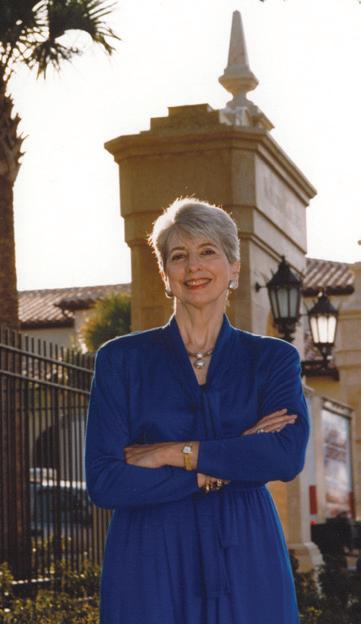


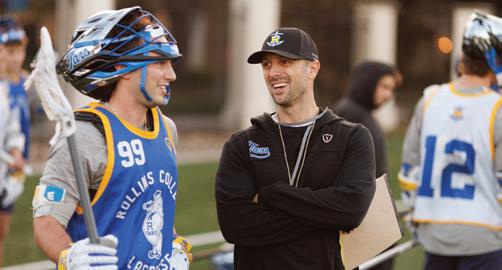

Because of the small class sizes and my close relationships with physics professors, I’ve been able to participate in hands-on graduate-level research that wouldn’t be possible anywhere else.
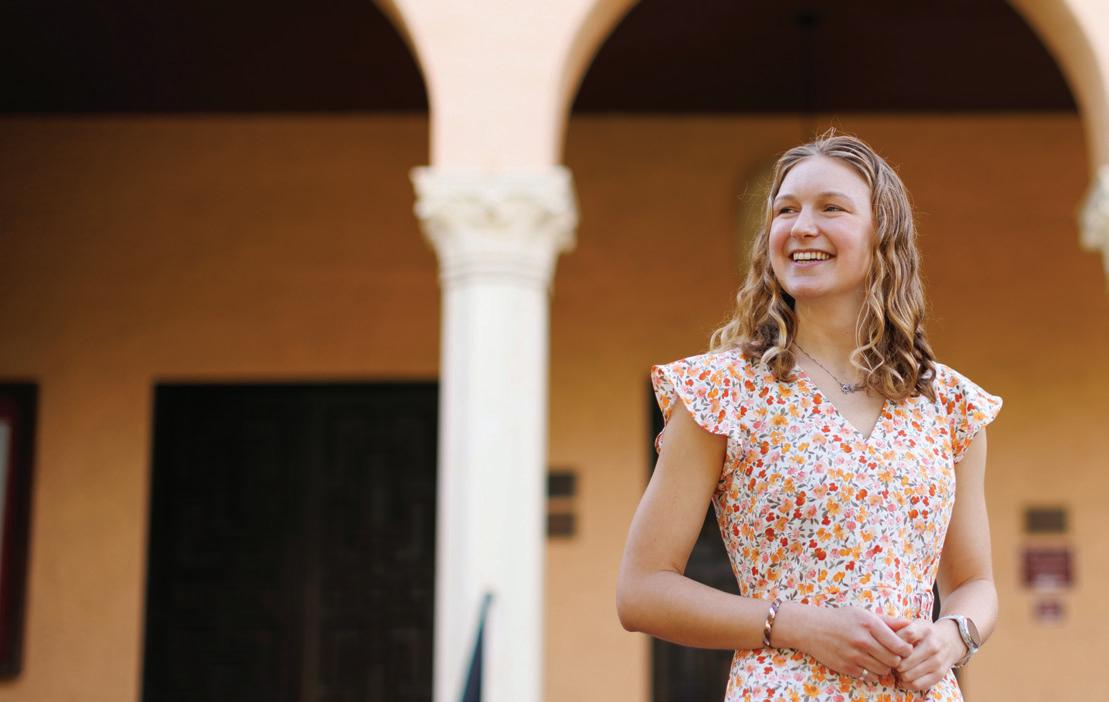
Physics major Makayle Kellison ’25 has earned a 2024 Goldwater Scholarship, the foremost undergraduate award in the STEM fields. Kellison’s journey to the Goldwater began when she first started working alongside physics professor Whitney Coyle and a team from Brigham Young University (BYU) to conduct acoustical research on the historic launch of the Artemis I rocket. Fast-forward two years, and Kellison has been published in scholarly journals and presented the team’s findings everywhere from the NASA Marshall Space Flight Center to the annual conference of the Acoustical Society of America. Kellison will return to BYU this summer to continue her research before graduating from Rollins in December and eventually starting a PhD program—no doubt launching the field of experimental aerospace research into a new orbit.
For the 11th time, Rollins has been named a top producer of Fulbright Students and Scholars by the U.S. Department of State.
The Institute of International Education has once again ranked Rollins among the top 10 master’s-granting institutions in the U.S. for the percentage of students who study abroad.
Niche has named Rollins among the top 100 liberal arts colleges in America
Peyton Connor ’24, Adam Lahlou ’24, and Eve Wasil ’24 have earned 2024-25 Fulbright Scholarships. The awards include two teaching positions and a research assignment.
In addition to winning a Fulbright Scholarship, Adam Lahlou ’24 has earned a Boren Scholarship, a prestigious award reserved for students who intend to pursue careers in federal national security.
The Princeton Review has ranked Rollins in the nation’s top 25 schools for student support, citing the College’s array of supportive programs and resources that target the many layers of a college education.

During this Intersession class, we gained such valuable hands-on experience. We got to check hoop traps for conservation surveying purposes and even got to handle and collect data on a snapping turtle.”
Yanelle Hernandez ’25, an environmental studies major whose experience in biology professor Bobby Fokidis’ Animal Conservation class has solidified her goals of pursuing a career in wildlife conservation
During spring break, our students seized opportunities to explore real-world issues and grow as global citizens.



Communication professor Anne Stone and Social Impact Hub staff director Melissa Nelson led students on a field study to Ireland, where they explored communication differences and the efforts of the country to become more environmentally conscious.
Students on the Trinidad & Tobago Immersion engaged in direct service projects focused on community development, cultural heritage, and conservation issues like turtle protection, forestfire prevention, and climate change.
While exploring museums and working with local nonprofits on an alternative spring break in Washington, D.C., students learned to think critically about their own identity while examining the lived experiences of the diverse communities of color who call the nation’s capital home.
297 By the
$459,052
The number of beds planned for East End Neighborhood, a new residence hall that will provide additional housing on campus
The amount raised on Giving Day 2024, unlocking essential aid for everything from scholarships to athletics to applied learning opportunities

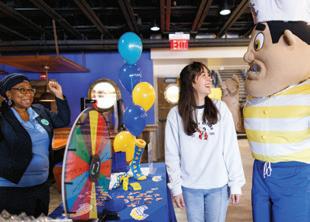
The number of stops on the self-guided Mister Rogers Walking Tour, which now features an accompanying audio tour (available wherever you get your podcasts) to enhance your experience 5 5
24
How many new students were inducted this year into Rollins’ chapter of Phi Beta Kappa, the country’s oldest and most prestigious academic honor society
44
The number of additional artworks from the Alfond Collection of Contemporary Art that can be displayed in the newly expanded Alfond Inn
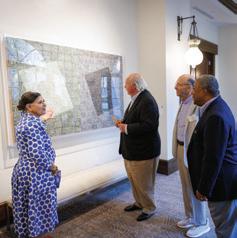

13 13
The number of consecutive years that Rollins has earned the NCAA President’s Award for Academic Excellence. Rollins’ 96 percent academic success rate among our studentathletes earned the top spot in Florida and tied for seventh best in the nation.

Rollins’ legacy of academic and athletic excellence continues to empower student-athletes like Ben Kopen ’24 to thrive both on and off the field.
By Jessica Firpi ’11 | Photos by Scott Cook ’24MBA
Rollins scores big when it comes to both athletics and academics, regularly ranking among the best Division II colleges in the nation. Reflecting a tradition of achievement, we have earned the NCAA President’s Award for Academic Excellence for 13 consecutive years, boasting the highest academic success rate in the Sunshine State Conference and the seventh highest in the country.
Our student-athletes are equipped to unleash their full potential whether it’s in class or on the
field. Take, for instance, business management major and lacrosse player Ben Kopen ’24, who has gained invaluable experience while forging lifelong connections and receiving an education that goes beyond textbooks and athletic competitions.
“Skills like leadership, teamwork, and adaptability are invaluable assets that will shape my journey long after graduation,” he says.
Hear in his own words how Kopen leveraged Rollins’ competitive advantage on his pathway to purpose.

“I’ve learned so much about coachability and adaptability, about working in teams and leading teams. Coach Gary DiClementi does a great job of pushing me. In his office, he has a sign that says, ‘Call your mother.’ It’s one example of the reminders the coaches give us to be good people and always be thinking of more than just the next game.”

“The buffet-style dining hall at the Campus Center has so many options. As athletes, we’re running around in 95-degree weather, so getting as many calories in as possible to make sure we’re building muscle is important. Mobile-ordering at a few of the other campus spots is great too since often I don’t have time to sit down for a meal.”
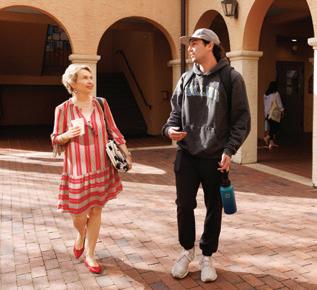
“Throughout my time at Rollins, my professors took note of the topics I gravitated toward in class, recommending internships and helping me look at courses that matched my interests. At a small school like Rollins, professors are really able to connect with their students because they get to know you as a person.”

“Rollins really emphasizes applied learning. I studied abroad in Rome for a semester, and I’ve done multiple internships. Recently, I worked as a corporate finance and strategy intern at the Orlando Utilities Commission, which helped me narrow down my job search to equity research positions within the financial sector.”

“Even though Rollins is a DII school, it has state-of-the-art training and sports facilities. Each team is assigned to a specific trainer who oversees things like nutrition, workout regimens, and muscle recovery. While I put heating pads on my legs and use Normatec compressions, I also like to get some studying or homework done.”
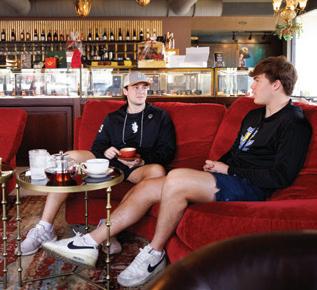
“Every first-year or transfer student on the lacrosse team is assigned to an older teammate to help them adjust to college. My peer mentor helped me a lot with time management. It’s great to pay that forward now with my mentee. We get together pretty often and play pickleball or meet for coffee or I’ll help him proofread an essay.”
Make a gift to Rollins Athletics and help your favorite team score everything from scholarships to new equipment.
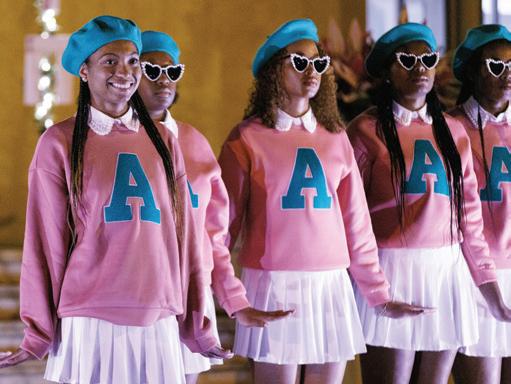
Rollins made history when the Alpha Kappa Alpha Sorority, Incorporated—the oldest established Greek-letter organization for Black women and the second Divine Nine sorority on campus—initiated 12 Tars into the Upsilon Pi chapter, a momentous milestone for Rollins and the Central Florida Black community.

During Intersession, the Alfond Scholars and Bonner Leaders—recipients of Rollins’ most prestigious scholarships—explored issues of immigration rights and the interplay of economics on a visit to Hope CommUnity Center in Apopka, completing service work, engaging with community members, and learning about their important work with immigrants and farmworkers.
To celebrate the fourth annual Thaddeus & Polly Seymour Acts of Kindness Day, Tars came together throughout the day to show their commitment to both service and Rollins, including swapping anonymous messages of kindness meant to brighten each other’s day.

The Alfond Inn celebrated the grand opening of its much-anticipated expansion, which features 71 new guestrooms, a wellness spa and fitness center, an additional 2,400 square feet of meeting and event space, and a light-filled lobby cafe that doubles as a wine-and-dessert bar in the evenings.


As a long-standing tradition, graduates of the College of Liberal Arts walked across the commencement stage on Mother’s Day, marking the culmination of their Rollins journeys and the dawn of their promising futures. Additionally, Hamilton Holt School and Crummer grads marked their milestone moment the same weekend.

Fox Day was once again everyone’s favorite day of the year. It was just too pretty to have class, so Tars enjoyed campus activities like yoga on the lawn, woodcrafting, building fox plushies, and of course, getting out on beautiful Lake Virginia for some paddleboarding, canoeing, and kayaking.
The Rollins chapter of Phi Beta Kappa inducted 24 new members at the Rice Family Pavilion. Less than 1 percent of all college students in the U.S. qualify for acceptance into Phi Beta Kappa, which is the nation’s oldest and most prestigious academic honor society.

The Bush Science Center’s new STEM Hub fosters opportunities for learning, connection, and equity.
By Laura J. Cole ’04 ’08MLS Photo by Scott Cook ’24MBAMost mornings, Madison Linn ’25 is among dozens of students taking full advantage of the new STEM Hub, which has quickly become the go-to spot for math and science majors to study for exams, discuss coursework with classmates, or receive tutoring and guidance from fellow students.
“Since opening last fall, the STEM Hub has become an unofficial club for STEM students, where we support each other and share our academic journeys and career aspirations,” says Linn, a biochemistry/ molecular biology major who serves as a peer supplemental instructor assisting other students.
The Hub was created as part of a grant from the Howard Hughes Medical Institute to develop programming that fosters inclusivity and equity among STEM students through curricular change, faculty development, and community building. Biology professor Brendaliz Santiago-Narvaez leads the latter initiative, which included creating a social media presence for STEM majors to engage digitally along with securing and designing the physical space.
The furniture is modular, so it’s easy to move around, and it has built-in charging stations. There’s a whiteboard to work out problems and free materials like notebooks and pencils. Most importantly, STEM tutoring sessions are now available in the building where these subjects are taught.
“Our science majors are always in Bush, so it makes sense to offer this service here,” says SantiagoNarvaez. “But we also want the community building to happen naturally. We want a space where students can ask questions without feeling pressured and judged. Their classmates understand what they’re going through, and it’s so important to nourish those opportunities for connection and growth.”
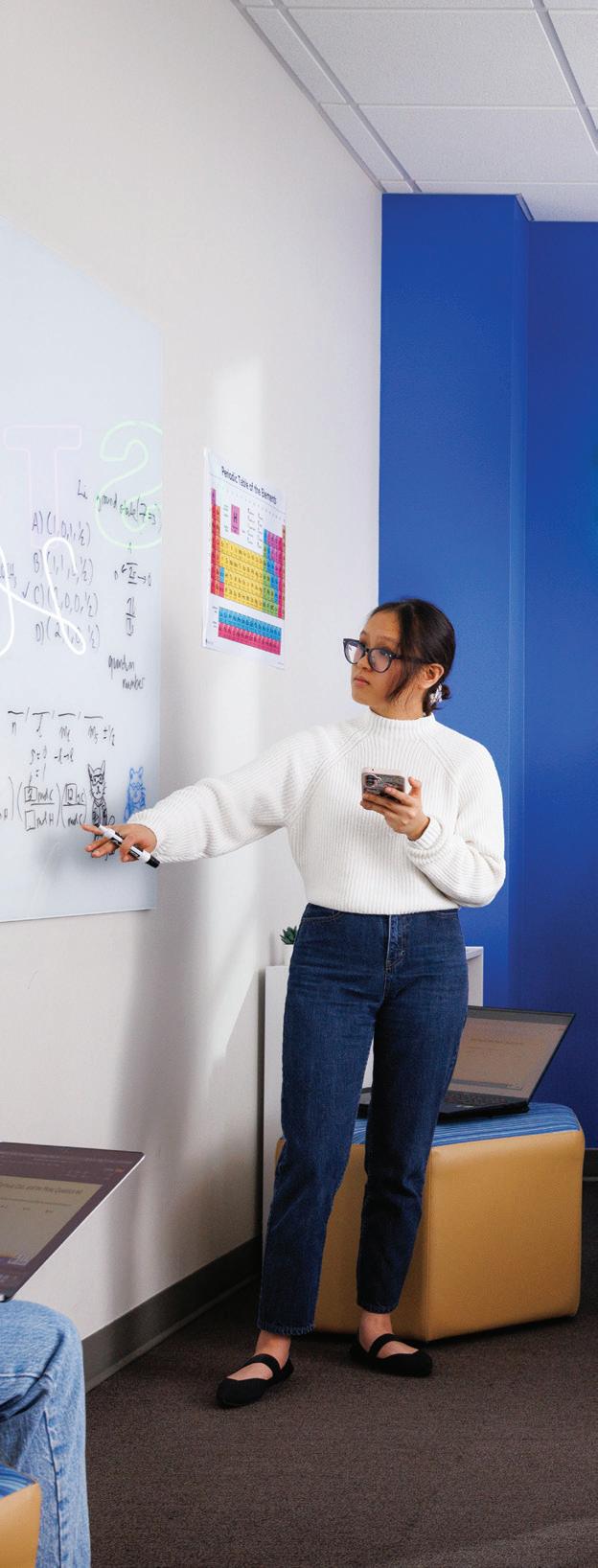

We celebrate seven faculty members and one coach who retire this year after nearly 250 years of combined service to Rollins.
By Laura J. Cole ’04 ’08MLS Photos by Scott Cook ’24MBAA bigger purpose. A sense of service. A capacity for wonder. These are the lasting legacies that seven beloved faculty members and one head coach who are retiring this year have passed down to generations of Rollins students—but are also the ethos they live by. Each of them has had a profound impact on their students, the community, and their areas of expertise, and none show any signs of slowing down as they embark on the next adventures in their meaningful lives.
We recently caught up with these passionate, long-serving educators to reflect on their favorite memories, what they’ll miss most, how they want to be remembered, and their nearly 250 combined years of service to Rollins and its community.
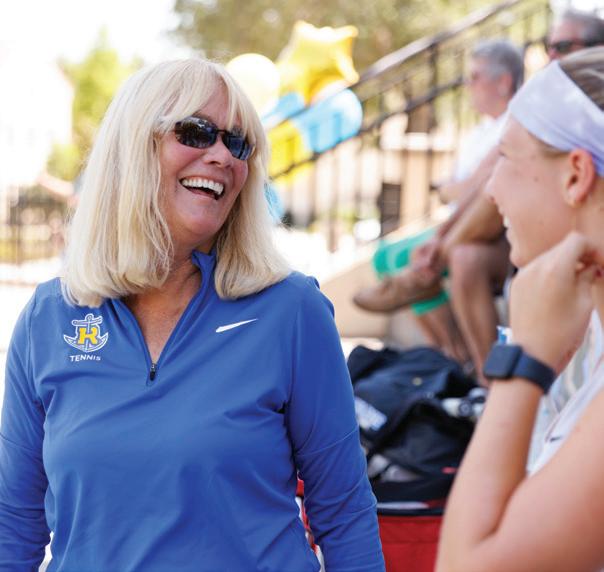
Few people approach life with Bev Buckley’s decisiveness. After going undefeated in tennis in high school, she knew she wanted to play both in college and professionally. And before she even graduated from Rollins, she knew she wanted to return one day to coach at her alma mater.
“I told my coach, Ms. Mack, to call me when she was ready to retire because coming back to coach at Rollins was my dream,” says Buckley. “From the moment I first picked up a racket at age 12, my life has been about tennis. I couldn’t have written a better script.”
That script includes playing on the women’s professional tour at Wimbledon, the U.S. Open,
and the French Open, among others. It includes 530 wins as Rollins’ head coach, 20 consecutive NCAA Tournament appearances, 21 All-Americans, and leading 57 scholar athletes to success both on and off the court. Her legacy will continue at Rollins as her former player Tasi Purcell Batista ’07 steps into the role as head coach.
I played for Bev for three years. I’m so grateful for the memories of being coached by her—lots of laughs and lots of tears. Being on the tennis team was the best part of my Rollins experience, and I’m forever thankful that she gave me a shot.
Elissa DeCampli Jovita ’14 ’18MBA
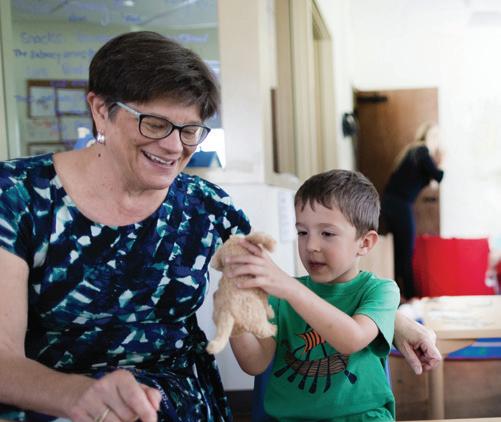
During her tenure at Rollins, Sharon Carnahan has led the Hume House Child Development & Student Research Center from a part-time play group to a full-time model of early childhood education and laboratory for psychology students.
Her love of babies began while studying the cognitive development of 6-month-olds as a grad student, but it was a community engagement course she was asked to teach her first year at Rollins that led to her “love affair with field studies as a way to engage students.” That includes having students work with children at Hume House, visiting a synagogue in her Psychology of Religion course, studying families in Costa Rica, and spending the night with migrant farmworker families in Apopka.
“Learners build their own knowledge rather than passively receive it,” she says. “I’m proud of our graduates and of the letters I get from them years later—school and clinical psychologists, counselors, therapists, CEOs, lawyers, and parents—about how these experiences have affected their lives.”
Dr. Carnahan introduced me to the field of school psychology, and I had the pleasure of working with her in early childhood education research. This collaboration led to grad school opportunities and employment in the community. I feel so blessed to be one of the many lives she touched at Rollins.
Mallory Gladman ’10 19 98 Since 1 9 9 0 Since
Cara Lavendol Walls ’03Music drew Gloria Cook to Rollins. She had heard of the College’s program through its association with the renowned Bach Festival Society of Winter Park and wanted to be part of a place that offered master classes and invited world-famous artists to perform. An accomplished pianist herself, Cook has played with the Springfield Symphony, the Hong Kong Philharmonic, and the Charleston Symphony, among others.
It was at Rollins, though, while twice chairing the curriculum committee, that she discovered the importance of “teaching my students beyond the 88 keys.” For Cook, that meant teaching discipline combined with an understanding of the world, including its people, cultures, and languages.
“Only by becoming global citizens and responsible leaders and having lots of preparation and discipline can students successfully communicate the universal language called music on stage,” she says.
Gloria’s passion for inspiring us all not only to practice often and have discipline but to understand the importance of being a good person greatly impacted me. My favorite memory of her was when she played a Rachmaninoff duet in the Knowles Chapel with outstanding musicality, precision, and drama.


The primary lesson Tom Cook hoped students would take away from his courses is the same one he modeled: “Be skeptical, be critical, be curious,” he says. “Don’t lose the capacity for wonder.”
In classes on early modern philosophy, biomedical ethics, and even Malcolm X, he could be found walking around the classroom barefoot, challenging students to consider how they could know anything with “absodamn-lute certainty.” During his tenure, Cook served as director of the Master of Liberal Studies program, president of the Arts & Sciences faculty, and head of the Hamilton Holt School’s humanities major, earning all of Rollins’ top awards for teaching.
Tom Cook was one of my all-time favorites. The way he’d sit on his desk, the way he told his stories, and his enthusiasm for teaching made all of us look forward to each discussion. He truly made us think and grow.
ShannonBrady O’Grady ’98
Despite changes in pedagogy, politics, and technology, one thing has remained constant for Scott Hewit: Students should always be at the center of teaching. Thirty years ago, that truth led him from teaching at a large state university to Rollins.
“Being at a small liberal arts college gave me an opportunity to be a teacher in the way I wanted my students to be teachers,” he says. “I got to develop activities and classes that I never would’ve been able to in a large lecture hall.”
Hewit’s approach has produced three decades of passionate educators who have gone on to become Teachers of the Year and Fulbright Scholarship winners, making a difference in the lives of students across the state and around the globe.
After 23 years of teaching my own students, I still remember being inspired by Dr. Hewit’s lessons and valuing his advice and encouragement. He supported my growth as a new teacher and helped me lay the foundations of my career.
Nicki Weston’97
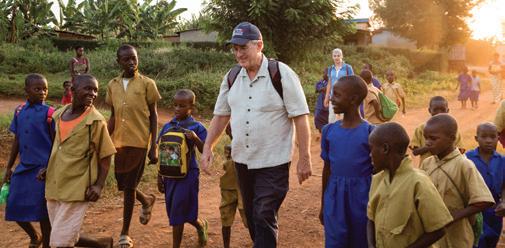 Kathryn Norsworthy Professor of counseling
Kathryn Norsworthy Professor of counseling
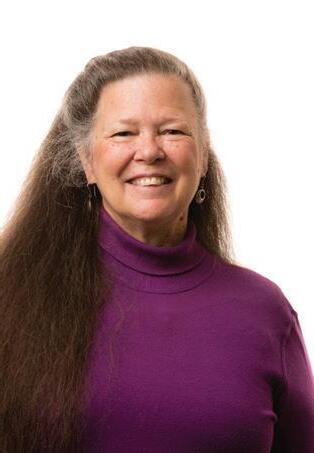
When Kathryn Norsworthy joined Rollins, it was the first time she’d ever set foot on a liberal arts campus.
“When I got here, I realized the possibilities to be creative and to pursue new directions. I don’t think I would’ve been able to do all the things I have—my international work, my activism—anywhere else.”
For over two decades, Norsworthy has been deeply committed to everything from LGBTQ+ civil rights to migrant and refugee rights, receiving numerous awards in her field. She is equally proud of the work she has done in collaboration with her colleagues to grow Rollins’ graduate counseling program into what it is today. Her service work, research approach, and pedagogy have benefited 30 years of students who’ve learned mindfulness, the benefits of centering participants, and community engagement.
I’ve taken what I learned from Kathryn and spread her messages of love and acceptance to all of my clients. She was always a soft place to fall. I think of her often and of the legions of therapists who are better and more skilled for knowing her.
Elaine Kelpien Federico’97MA
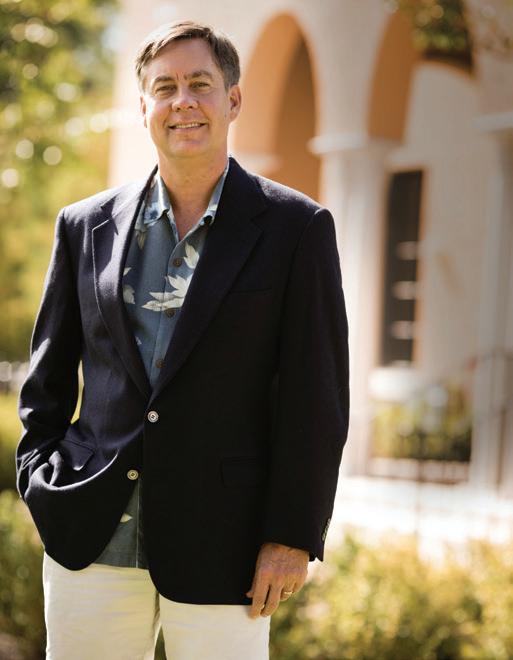
Few would consider how an IRS audit could transform one’s teaching—and the environment. But such was the turn of events for Bruce Stephenson when he was asked to share with the IRS his students’ work in the Genius Preserve. The protected area near campus has a conservation easement that allows for significant tax exemption for the Elizabeth Morse Genius Foundation as long as it’s used for educational purposes.
“Sharing my students’ work with the IRS was life-changing,” he says. “The detailed reports met government requirements, and the foundation funded the Genius Preserve restoration for the next 20 years, which has gone on to inform scores of students.”
Along with encouraging preservation, Stephenson has introduced nearly three decades of students to urban planning, a passion that has led to several publications as well as major awards, including the John Brinckerhoff Jackson Book Prize in landscape architecture and the Addison Mizner Medal for Pedagogy.
Dr. Stephenson really nurtured my love for city planning and environmental literature. His vision of practical education changed the course of several students’ careers, including my own.
MarcusMosquera ’22 ’26MLS
It’s not surprising that Susan Libby loves creativity. Her scholarship focuses on 18th- and 19th-century French art. But it’s the creativity she finds in the classroom that she loves most. Since joining Rollins, Libby has developed more than two dozen new courses on topics ranging from culture wars to rebel artists.
“There’s a difference between telling people what to read or write and actually engaging them,” she says.
For an exhibition she co-curated at the Rollins Museum of Art in 2017, for example, her students participated in the selection and installation of the works, wrote the wall texts, and gave tours.
But often, it was allowing students to pursue their own ideas like when art history majors in her course on women and art asked to create an installation on campus rather than write a research paper. The installation— Barbie dolls hanging in a gazebo to highlight the media’s tyranny over women’s bodies—was supposed to include hanging cards with quotes about women’s bodies, but a printing mishap delayed the two appearing in tandem and students thought it was an attack on women.
The experience taught both her and the students a lot about artistic intent versus audience interpretation and gave her admiration for her students’ creativity and determination.
Dr. Libby is the most amazing woman—not only an amazing professor but also a great advisor who’s passionate and kind and who cares deeply about art and her students.
 Morgan Conroy ’12
Morgan Conroy ’12
Rollins’ 13th president, Rita Bornstein ’04H ’04HAL, lived a life of perseverance, driven by a respect for education, demand for excellence, and deep care for others.
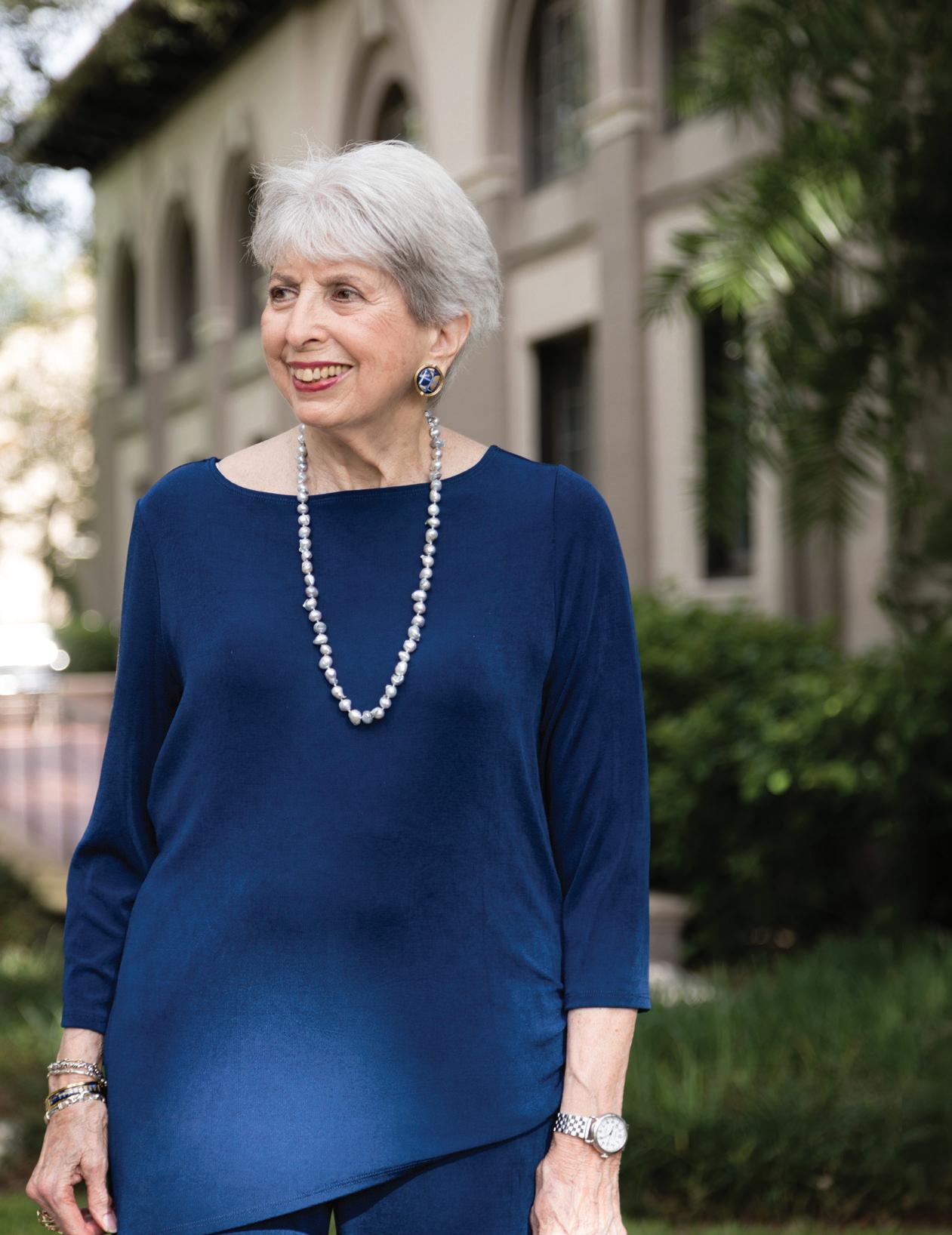
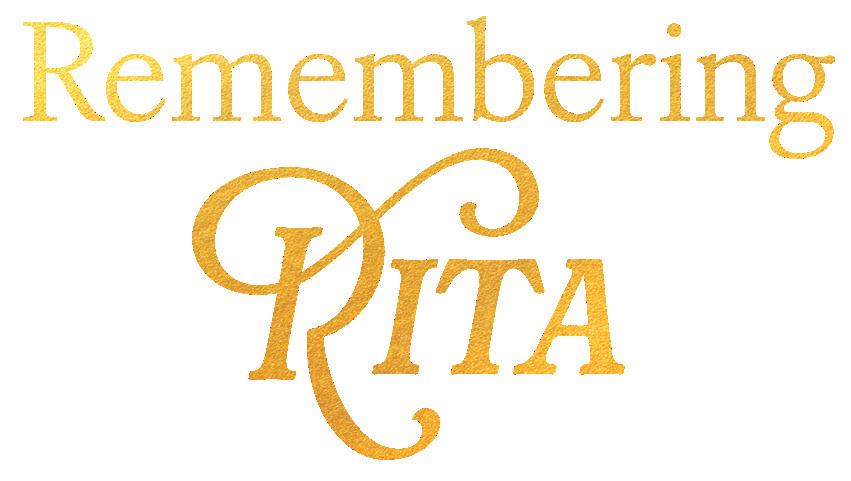 By Laura J. Cole ’04 ’08MLS
Photos by Scott Cook ’24MBA and courtesy Rollins College Archives
By Laura J. Cole ’04 ’08MLS
Photos by Scott Cook ’24MBA and courtesy Rollins College Archives

While descending six floors of stairs, Rita Bornstein sang. In fall 2022, Hurricane Ian hit Florida, causing the basement of The Mayflower—the senior community in Winter Park where she lived—to flood and the elevators to stop working. It was nearly 20 years since she had been diagnosed with Parkinson’s disease and had retired from her position as president of Rollins (though the one was certainly not the reason for the other), and she was mostly—but not entirely— wheelchair-bound.
When personnel arrived at her home on the sixth floor to help her evacuate, they offered to carry her down.
“Rita would have none of it,” says Barbara Harrell Child, professor emerita of English. “Parkinson’s will sometimes cause people to freeze, but Rita had heard that if you sing, it will sometimes release the freeze. It took her a while, but she walked down all of those stairs, singing. I love that image of her—singing and dancing as long as she did. And boy, she really, really did.”
The first woman to be president of Rollins, Bornstein died on January 9, 2024, at the age of 88. During her tenure, from 1990 to 2004, the College reached new heights in its academic reputation, boosted its economic outlook, strengthened community relationships, and saw the construction, renovation, or expansion of 25 facilities. Under Bornstein’s leadership, the number of endowed chairs tripled, enrollment grew by 60 percent, retention increased, and Rollins went from No. 6 to No. 1 in U.S. News & World Report’s annual rankings of the South’s best colleges.
“Rita Bornstein brought Rollins into the 21st century, both literally and conceptually,” says President Grant Cornwell. “We benefit today from choices made in her presidency. I’m so glad Rita and I enjoyed a relationship where she could tell me exactly what she thought. She understood we were both driven by the same commitment to Rollins students and their success. Our conversations about higher education and leadership were always enlightening, not to mention she was so much fun.”

After graduating high school in New York, Bornstein was accepted to the University of Chicago, which she attended for three months before dropping out—only later discovering its reputation and regretting her decision to leave.
Rita Bornstein brought Rollins into the 21st century, both literally and conceptually.
— President Grant Cornwell
“She grabbed her guitar and headed for California,” says Child. “She worked at a factory for a while and continued to dance. When she realized she’d never be the best dancer, she gave it up. But I think she always remained a dancer in her grace and her ability to call on all parts of herself to express what she wanted, what she believed in.”
It was in Los Angeles that Bornstein also got married and had her daughter, Rachel, at only 20 years old.
“I was frustrated in ways that I couldn’t have articulated at the time,” wrote Bornstein. “I realize


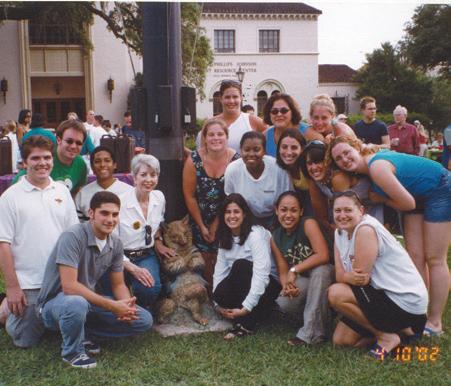
now that I was yearning for more. I wanted more education. I wanted to make an impact.”
After a divorce, she moved to Miami, where she remarried and had a son, Mark. And she began to get the additional education she sought, this time at Florida Atlantic University, where she earned bachelor’s and master’s degrees in English.
Bornstein taught at an experimental high school while earning her PhD in educational leadership from the University of Miami (UM), where she was later based while promoting sex equity and Title IX through the Southeast for the U.S. Department of Education. She joined the development staff in 1981, soon becoming vice president and raising $517.5 million toward the Campaign for Miami—among the largest and most successful fundraising efforts in higher education at the time.
Her work at UM garnered the attention of the presidential search committee at Rollins, where she succeeded Thaddeus Seymour ’82HAL ’90H as president in 1990.
“Her strengths as a fundraiser were so strong, and those we reached out to for their impressions of her leadership and capabilities were resounding in their recommendation,” says longtime Rollins board member Allan Keen ’70 ’71MBA ’10H, who led the search committee. “We made the right choice. Her ability to raise money and set high goals and standards for educating our students was impressive.”
Bornstein’s fundraising abilities would come to dominate many conversations about her presidential legacy. She secured
$160.2 million for Rollins in support of academic programs, scholarships, facilities, and faculty funding, including 16 endowed chairs—and increased the endowment from $39 million to $260 million.
But fundraising was a means to achieve the real goal, which she laid out in her inaugural address: “We will be unrelenting in pursuit of the resources necessary to support the flourishing of excellence, innovation, and community.”
The latter two engendered what remain at the core of the Rollins experience: Rollins College Conference (RCC) courses for first-years, Living Learning Communities, and what would become the College’s annual SPARC Day of Service. But perhaps Bornstein’s greatest legacy is her demand for excellence, a vague term made tangible when she elevated the perception of Rollins both internally and externally.
“When Rita left, she had significantly increased the academic reputation of the College,” says Rollins historian Jack Lane. “When the Associated Colleges of the South had to choose a college from Florida, it chose Rollins almost immediately. Four or five other colleges applied for it, and Rollins was chosen. And it was no accident that Rita was president when they asked us to join.”
As a leader, Bornstein saw it as her responsibility to make Rollins part of the national conversation, and to that end, she served on several boards, including the American Council on Education and the National Association of Independent Colleges and Universities.
Bornstein and her husband, Harland Bloland
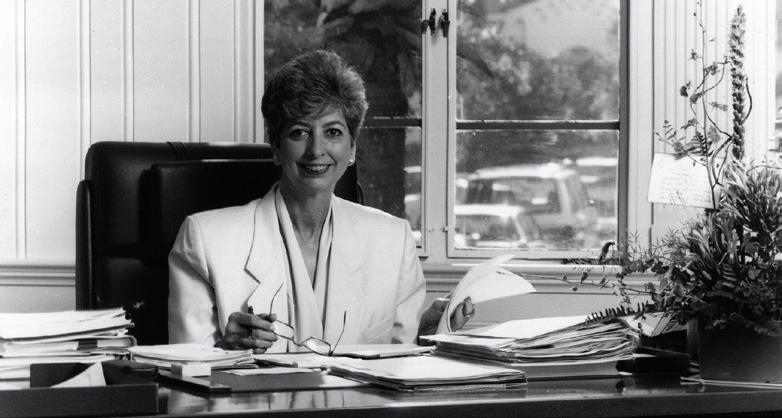
“Rita always wanted the best—not in the sense that she was necessarily going to buy the best car, but intellectually and socially,” says Hoyt Edge, professor emeritus of philosophy and former associate dean of the faculty. “There was sort of a moral element in there. The best was what made for flourishing individuals like herself, but she was just as concerned for that flourishing in others.”
This could be advising a local business leader on starting a business or mentoring students like Chrissy Garton ’06, whom she met on Garton’s first day at Rollins when she overheard her say she planned to become Secretary of State.
“Never in a million years would I’ve guessed that on that day 22 years ago I’d meet the single most important person in my life—who would become my mentor, confidant, and lifelong friend,” says Garton, a philanthropic advisor and social impact strategist. “Although my career goals changed, Rita’s enthusiasm and support for me never did. Our friendship impacted every part of my life from my leadership style and career objectives to my marriage and relationship with my children. She was accomplished by all measures and didn’t need to care about the little things in my life, but she did—deeply.”
Bornstein never stopped caring deeply—or learning. In her retirement, she helped lead the effort to raise the first $80 million to bring the Dr. Phillips Center for the Performing Arts to life and create a world-class cultural center in Orlando. She served on its board as well as
‘I hope most people don’t remember me primarily as a fundraiser.’”
Like so many others, O’Sullivan does not. He’ll remember her as a resilient woman who laughed easily, took her role as president seriously, saw herself as a public intellectual, and was certainly a Renaissance woman.
— Lorrie Kyle ’70 Executive Director, Office of the President
the boards of the Winter Park Health Foundation and the Parkinson Association for Central Florida.
When she moved to The Mayflower, she started a speaker series after discovering that the community members would benefit from more intellectual stimulation. She invited former Rollins faculty members, including emeritus English professor Maurice O’Sullivan, to speak.
“She called me on Thanksgiving to thank me for giving the talk and started reminiscing about the past and her legacy, which she rarely did—that should have been my clue that she wasn’t doing well,” he says. “The first thing she said to me about it was,
“It’s such a cliché to say Rita was larger than life,” says Lorrie Kyle ’70, executive director of the president’s office, “but I can think of no one who knew and did and cared about so much.” Kyle, who was hired by Bornstein at the start of her presidency and has served all three Rollins presidents since, has long been known as her go-to-girl-turned-dear-friend, someone Bornstein depended on throughout her presidency and beyond. “Rita embraced the world’s possibilities and encouraged us all to join in. She brought life to my life.”
“She really was a woman who lived life fully,” echoes Child. “She just embraced it all and kept on dancing—and singing—until the very end.”
Bornstein and Fred Rogers ’51 ’74H By Adrienne Egolf | Photo by Scott Cook ’24MBAA leader in the social impact space,
’11 ’15MBA sees the promise of connecting passionate people with meaningful opportunities.
Isabel Artemis DeJesus ’11 ’15MBA remembers the moment when her calling became clear.
“I took a macroeconomics class my first semester at Rollins,” she says. “To this day, I always say, it either clicks and you love it—or it doesn’t and it’s the most difficult class ever. For me, it clicked. I remember learning how one country’s economy could impact the whole world. I loved it.”
These days, DeJesus—who was awarded Rollins’ 2024 Recent Alumni Achievement Award—describes herself as a conduit: “I help connect people with opportunities to change the world.” As the vice president of administration and programs at the Watson Institute, she oversees fellowship programs that support social impact founders and provide leadership training. But she still recalls learning about the ripple effects of global economic policies, doing projects on small-country economics, and studying the economics of piracy as an undergrad at Rollins. She wouldn’t be where she is today, she says, without all the support that followed her first lightbulb moment.
“I was always encouraged to explore a little bit more and given opportunities outside class,” she says, remembering a student-faculty research project with economics professor Anca Voicu. “I remember being so nervous to present our paper at a conference, but I did it. And ever since, anytime public speaking comes up, I think of that moment.”
Another formative experience came when she studied abroad in Australia. She was paired with a prominent Australian coffee roaster for an accounting internship.
“There are things from that time that I draw upon today,” she says. “The company I interned for was all about fair trade and sustainability. These were things I didn’t know much about at the time, but they resonated. Here was a company that was creating great coffee but also thinking about the bigger picture. That became a guiding principle for my professional experiences: What does the company stand for?”
DeJesus credits Rollins’ emphasis on service learning and global citizenship for letting her lean into this passion for impact, following up a bachelor’s degree in economics with an MBA at Rollins’ Crummer Graduate School of Business.
As a graduate business student, DeArtemis built on her liberal studies foundation with practical skills in project management, financial modeling, case-study building, and analytical thinking. She also made a connection that would prove pivotal in her career.
“In one of my classes we did a consulting project for Rebuild Globally,” she explains. “I loved it and felt very connected to their work.” A social enterprise nonprofit focused on Haiti, Rebuild Globally—founded by Julie Colombino ’18MBA—is also paired with a for-profit arm that encourages sustainability.
“With my MBA brain, this big-picture thinking was really appealing to me, so I reached out to the founder and said, ‘How can I help?’”
That initial offer turned into an internship and eventually a full-time position as director of impact partnerships—a springboard for her career. In the years since, DeJesus has transitioned to her current role at the Watson Institute, where she’s launching an expansion of their existing fellowship program.
“Last year we started exploring the fact that not everyone wants to be a founder or entrepreneur, but there’s a whole group of ‘intrepreneurs,’ or people who are working from within a company, who also want a meaningful and impactful career,” she says, bubbly with excitement about the new ripples of impact this program stands to create.
“I’ve been feeling very nostalgic since I won the Alumni Achievement Award,” she shares. “I’ve worked hard the past decade to create impact and grow as a professional. It’s validating and exciting to be recognized for that. So what else is possible? What’s next? This is just the beginning.”
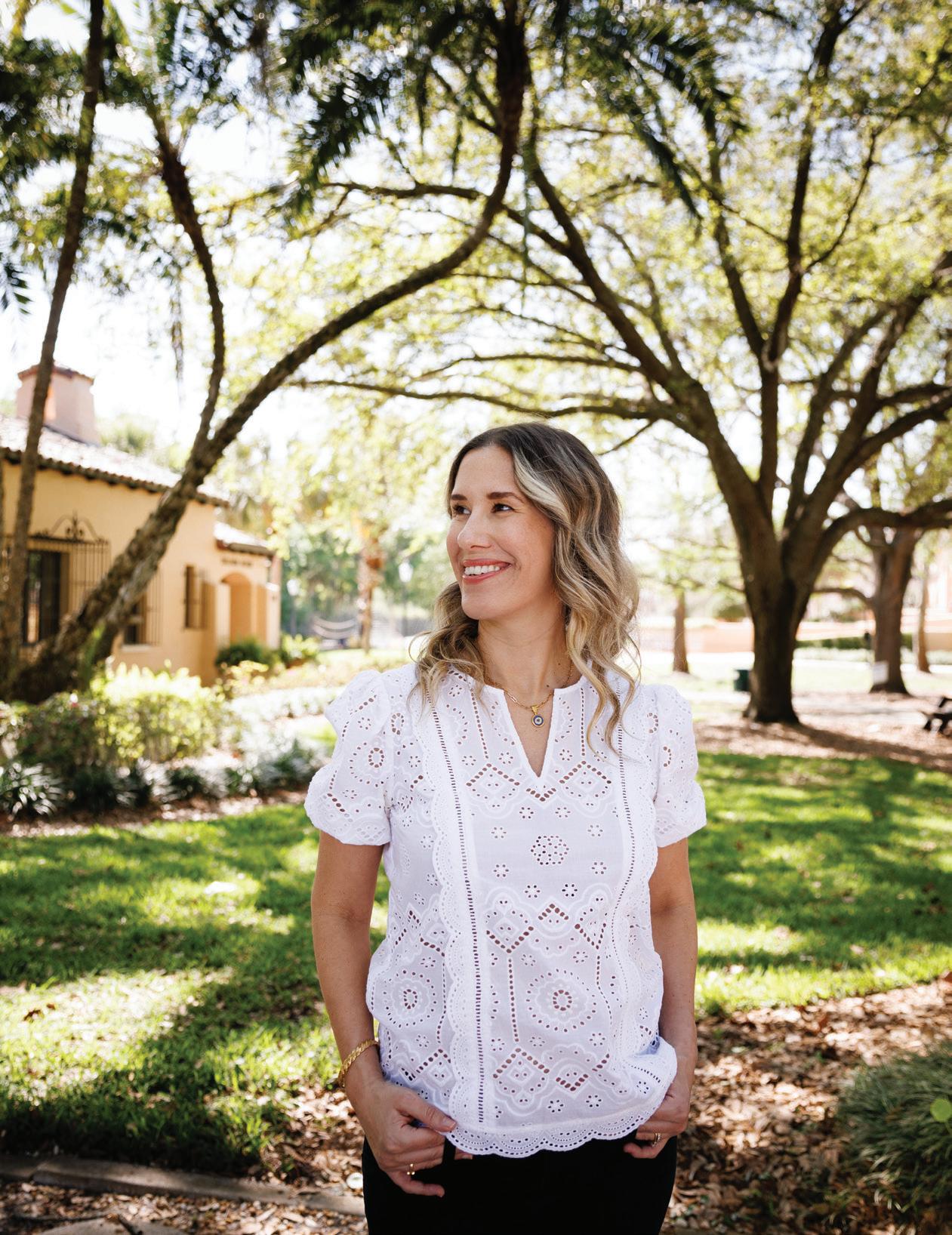

A behind-the-scenes look at the making of The Prom reveals the transformative impact of purpose-built spaces that empower our students to shine.
By Jessica Firpi ’11 | Photos by Scott Cook ’24MBATheatre major Rachel Kalski ’25 is beaming. She stands tall on a dressing platform in the new Tiedtke Theatre & Dance Centre’s Costume Design and Technology Lab while getting fitted for her costume—a steel-blue prom dress designed by Kelsey Grace Kidd ’25, student costume lead for The Prom. A recent Broadway hit, the musical comedy tells the story of a spunky, small-town high-schooler who connects with four eccentric actors from New York City after the PTA threatens to cancel prom to prevent a same-sex couple from attending. While placing pins to mark the dress’ new hemline, Kidd listens intently as Kalski talks through her movements on stage for the final number. The two theater artists realize almost simultaneously that the next time Kalski will be wearing Kidd’s expertly tailored costume will be on opening night—the moment just around the corner that they’ve all been working for.
Since opening in fall 2023, the 16,165square-foot Tiedtke Theatre & Dance Centre— which was made possible by a $5 million gift from Philip and Sigrid Tiedtke and generous

support from Sally K. Albrecht ’76—is already strengthening Rollins’ role as a leader in performing arts education.
The center combines cutting-edge technologies with intimate spaces that foster hands-on learning, radical experimentation, and student leadership. Classrooms dedicated to design and technology, dance, acting, and directing are equipped to help students create work uniquely their own and sharpen their skills on the stone of experience. Above all, the new facility creates much-needed cohesion for the department and allows students to realize productions at the historic Annie Russell Theatre on a whole new level.
With the musical The Prom closing out the Annie’s 91st season, we’re breaking the fourth wall, so to speak, to show you how the various elements of production—lighting, dance, costuming, acting, directing—all come together on stage and have been enhanced by the spaces in the new facility.
So take your seats—the curtain is rising on a new performing arts era at Rollins.
The set designs and props quite literally set the stage. Student set designers like The Prom’s Juliana Melendez ’25 use drafting programs Vectorworks and Procreate to design their visions and build a mini model to scale before getting approval from the directors. Using sophisticated equipment like a 17-by-32 moving painting wall for accessing backdrops, student designers, painters, and carpenters work with senior theatre design artist-inresidence Lisa Cody-Rapport and technical director Robert Miller to turn digital renderings and handdrawn sketches into fully realized, moveable worlds.
For The Prom, student prop master Avery Anger ’25 worked alongside production manager Lauren Cushman to source or create every prop.
From a master Excel list of 92 line props, Anger and Cushman found, thrifted, purchased, and repurposed everything from coffee makers and chairs to plastic champagne glasses filled with colored epoxy to mimic the real thing.
Melendez—who is focusing her major on technical theater—aims to pursue theme-park design, so Rollins was a natural choice, with its topranked program, proximity to the best theme parks in the world, and expert faculty like Cody-Rapport, who worked as a scenic artist at Walt Disney World before coming to Rollins.
“What’s unique about Rollins’ approach is the hands-on problem solving,” says Melendez. “I don’t have to know everything. I learn by doing.”


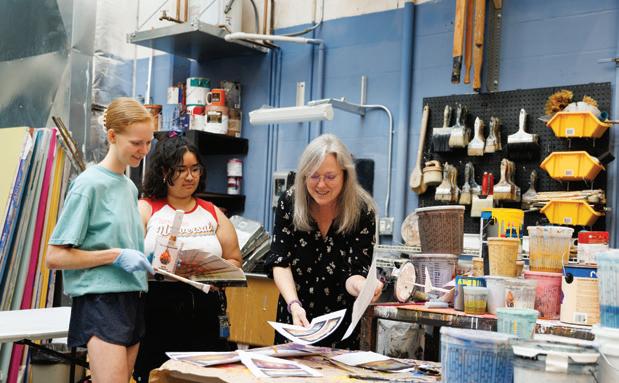 Student set designer Juliana Melendez ’25 (center) and theatre design artist-in-residence Lisa Cody-Rapport (right)
Production manager Lauren Cushman (left) and student prop master Avery Anger ’25
Student set designer Juliana Melendez ’25 (center) and theatre design artist-in-residence Lisa Cody-Rapport (right)
Production manager Lauren Cushman (left) and student prop master Avery Anger ’25
The lights in a theater production are essentially another performer without which the show could not go on. Using software programs Vectorworks and Lightwright, the lighting designers create systems for each focus position in the theater, including front, back, and side wash. From adjusting color using gels to shaping light with stenciled circular disks called gobos, every aspect is meticulously chosen and controlled by the lighting crew, who strategically employ warm or cool colors on opposing sides for a realistic look. The crew works daily for weeks installing lights in an immense electrical operation before compiling a cue list and finally programming every single light during tech week.
“I’ve really been able to hone my skills in technical theater,” says student associate lighting designer Zoe Henry ’25. “Rollins has given me the ability to learn and mentor others. Both of my lighting teachers at Rollins have encouraged me to take the lead on certain aspects of a hang, giving me leeway to advise and teach my peers.”
The Tiedtke Centre has been revolutionary for lighting design students, who now have at their fingertips the innovative Yeager Light Lab, which allows them to fine-tune storytelling via a 1/6th-scale working model of a theater. Theatrical and lighting design courses utilize the lab, enabling students to see what their designs look like under stage lighting, explore the impact of light on mood, create lighting cues synchronized to music, and undertake projects like lighting a scene from The Scottish Play
“It’s been amazing to witness the growth created by the lighting lab, and I feel as though we’ve only begun to tap into the space’s potential,” says Henry.
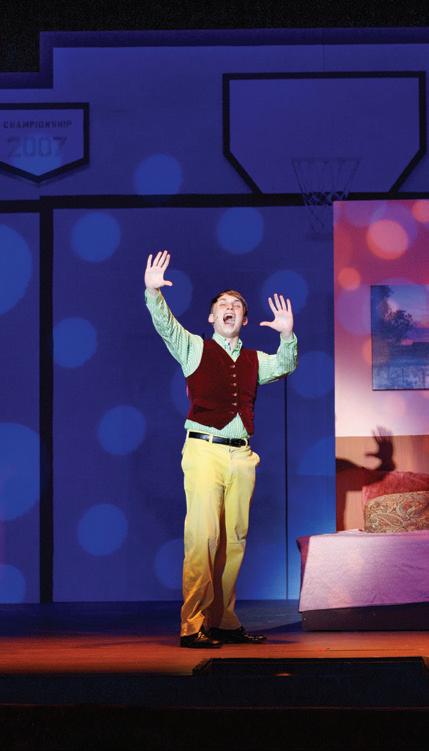
 Student associate lighting designer Zoe Henry ’25 (left)
Student associate lighting designer Zoe Henry ’25 (left)
The state-of-the-art dance studio features professional flooring with floating subfloor and multipurpose marley overlay, natural light streaming through giant arched windows, topof-the-line sound and AV equipment, and the professional finishing of full mirrors and barres.
Besides serving as an invaluable rehearsal space, the dance studio also hosts workshops on improvisation skills, audition technique, and hip-hop dance for theater-focused student organizations. Additionally, the dance composition course utilizes the space to choreograph original work for the annual Expressions dance concert.
“We can fit a small audience in the space as well as invite guest artists to teach and choreograph,” says Missy Barnes, Rollins’ director of musical theatre.

With dance director Robin Gerchman on sabbatical this spring, local professional choreographer Adonus Mabry staged the musical numbers for The Prom, talking through ideas with Barnes beforehand. As dance captain, Lillian Morrow ’27 not only assisted in teaching the choreography and served as a dance partner to the choreographer for partnered moves but also helped the actors improve their technique and polish the big dance numbers, investing hours creating instructional videos of herself performing the choreography.
“Taking what you learn in the classroom and then experiencing that in a practical application is what allows actors, dancers, directors, and designers to really deepen their understanding of the craft,” shares Barnes.
The 2,400-square-foot Costume Design and Technology Lab houses a costume shop with capacity for thousands of garments. In addition, the space boasts seven high-tech sewing machines, dedicated fitting rooms, a draft room, and much-needed storage space, allowing the costume designers access to an array of fabrics, tools, and materials.
“Tiedtke is laid out really well, with amenities that enhance our productions, like a 20-gallon dye vat and private dressing rooms,” says Kidd. “It makes it easier to design and experiment with a variety of styles.”
Taking inspiration from films like But I’m a Cheerleader, Kidd used Procreate to design hundreds of pieces for 24 performers in The Prom. Bringing her designs to life, like in all other productions, involved pulling garments from costume inventory, thrifting and purchasing new pieces, and starting from scratch, pattern to garment.
Under the guidance of Kidd and Allison Crutchfield, artist-in-residence for costume design and production, students on the costume studio crew did everything from sewing beads, adornments, and rhinestones by hand to tailoring and steaming the garments.
“This space has enhanced opportunities for students and allows for new creative decisions,” says Crutchfield. “Theater itself, especially working in the costume shop, teaches skills that make you a better person—patience, problem solving, and teamwork.”
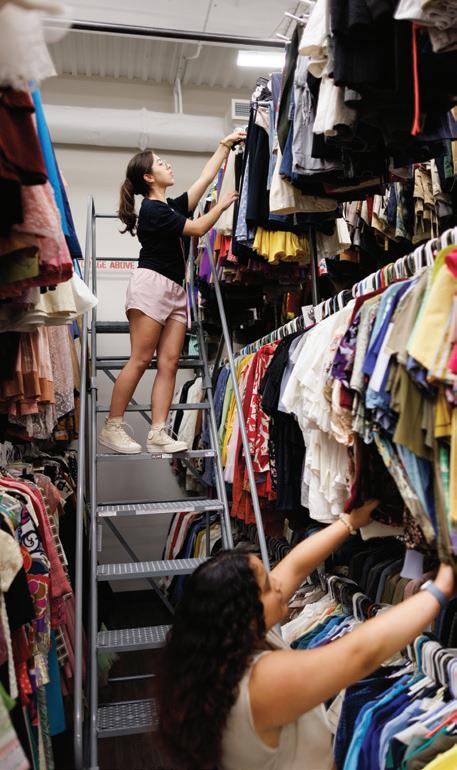

 Costume design and production artist-in-residence Allison Crutchfield (left) and student costume lead Kelsey Grace Kidd ’25
Costume design and production artist-in-residence Allison Crutchfield (left) and student costume lead Kelsey Grace Kidd ’25

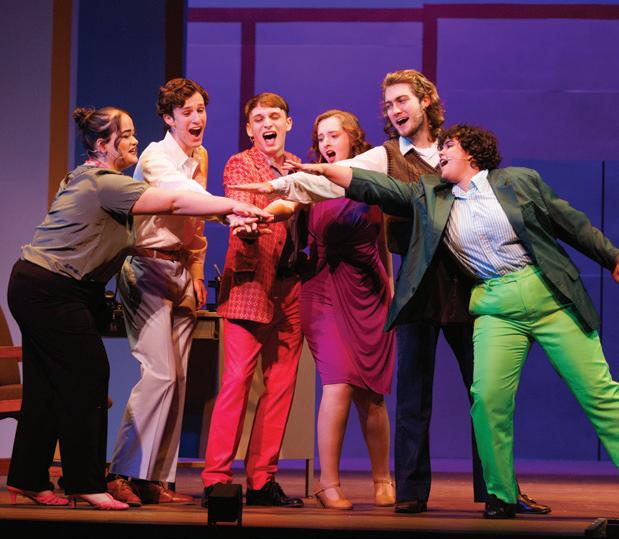
The directorial process typically starts more than a year before showtime, with the annual musical traditionally serving as the season’s final production. Although each director follows a unique process, the first step is to meet with the scenic and costume designers to formulate and solidify the show’s vision. From there, the director engages in casting, workshopping characters with the actors, discussing dance choreography, and staging dialogue scenes, working collaboratively with students and faculty at all stages of production.
Theatre arts major Kaila Cohen ’25 served as the associate student director on The Prom, working alongside Barnes. Cohen provided thoughts on casting, gave notes to actors, and even directed two scenes.
“One of the things I loved about associate directing this show was that Missy treated me as her equal—a collaborator and artist—while also acknowledging that I was a student learning,” shares Cohen. “This hands-on experience has allowed me to bring together all the areas of theater that I’ve been learning about. Directing has taught me the importance of trust, teamwork, confidence, storytelling, and creativity.”
Among the new spaces in the Tiedtke Theatre & Dance Centre is the dedicated acting/directing room, which provides more
space, rehearsal furniture, and creative freedom to explore when staging scenes.
“The new spaces allow for a more effective, efficient, and communicative production process,” says Barnes. “Having everything so close together is helpful for bringing all of the design and performance elements together to tell one cohesive story. We can rehearse choreography in the dance studio while another group of actors is rehearsing music or scenes, and Kaila and I can use the acting/directing classroom. A space this amazing just inspires me and the students to keep doing better and better.”
While faculty direct shows at the Annie, productions at the Tiedtke Centre’s Sally K.— Rollins’ Second Stage—are directed, designed, and performed entirely by students. The 1,900-square-foot, custom-built black-box theater features brand-new sound and light boards along with pull-out seating risers that enable layout transformations—an ideal canvas for imagination and experimentation.
“The experiences I’ve had as a theatre major have prepared me to take on a show on my own,” shares Cohen, who will direct Nowheresville in the Sally K. next spring. “Pursuing that opportunity certainly wouldn’t have been possible without my experiences on The Prom and the support of my peers and professors in this department.”
Rollins’ theatre program has prepared scores of graduates to take center stage in their meaningful lives and productive careers—whether it’s in the field as actors and directors or in adjacent creative roles that require key skills like communication and collaboration. Hear from a handful of grads about how their experience in the theatre department gave them what it took to follow their dreams.
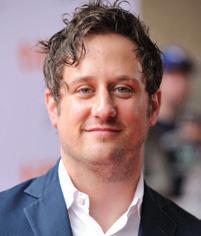
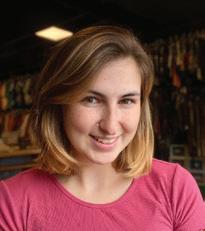
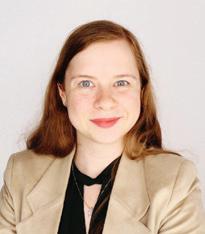
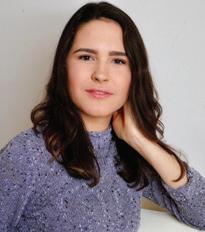
“My adventure in the theatre department was a true communal work-study experience. On one hand I was exposed to all elements of theater: history, stagecraft, directing, acting, all helping to lay a foundation of learning. On the other, I had this unique opportunity to make theater for a paying audience. At Rollins, I explored many different artists, writers, and styles, which has been similar to my own career trajectory. I really credit Rollins for my flexibility.”
Christopher Fitzgerald ’95 Broadway Actor, Three-Time Tony Nominee Waitress, Wicked, and Young Frankenstein
“My current role at Universal is a true combo of my majors in theatre and computer science. Show engineering at a theme park is essentially a permanent, immersive, theatrical experience. My hands-on experience with all technical theater specialties and having a basic understanding of lighting, sound, special effects, creative vision, and overall show design has allowed me to excel at my job. Between one-on-one time with professors and mentors and the tight-knit community, Rollins provided me with the opportunities and support system I needed to be successful.”
Mariah Haskell ’22 Associate Engineer of Show Controls, Universal Creative
“Theater directing is all about collaborating with teams—actors, designers, production team—to create the best end result on a budget and on deadline. That’s a lot like the project management work I do for my organization. [Directing professor] Thomas Ouellette was an incredible mentor to me. When I have a difficult situation now, I still think back to his advice, which largely informs my management strategy. My job now is to empower my teams to do their best possible work with the scope, schedule, and budget we’ve been provided.”
AnnMarie Morrison ’20
Agile Scrum Consultant, Deloitte
“At Rollins, I found a cohort of people and a faculty of people who really believed in me and allowed me to take the risks I needed to take artistically. And when I directed my first black-box production as a junior, that helped me build a portfolio that led to the Roundabout directing fellowship [in New York City]. Overall, I was able to see on a larger level what I was drawn to as an artist. I didn’t want to do theater that was just entertaining—I wanted to do theater that could educate, inspire, and change.”
Kathleen Capdesuñer ’17
Lead Producer, Grassroots Pro-Choice Theatre Initiative
By Laura J. Cole ’04 ’08MLS | Photo by Scott Cook ’24MBAFalecia Williams ’91 expanded her world by earning a Rollins degree. Now, she is working to expand the worlds of thousands of college students.
For more than 30 years, Falecia Williams ’91 has known this one thing to be true: A bachelor’s degree affords more opportunity than any other credential.
That truth has driven her ascent from first-generation college student to president of Prince George’s Community College (PGCC), located outside Washington, D.C. For nearly two decades prior to her current position, she worked at Valencia College, rising to regional president for both the downtown and west campuses. Her work at both institutions has been driven by a desire to offer people “the widest and most precise path” to earn a bachelor’s degree. And that focus has earned her numerous honors and awards, including recognition as one of D.C.’s Most Powerful Women by Washingtonian, 50 Most Powerful by Orlando Magazine, and the 2024 Distinguished Alumni Award from Rollins.
“School was a place early on in life where I felt tremendous acceptance and also tremendous aptitude,” says Williams, who went on to earn a master’s from Stetson University and a doctorate of education from UCF. “I was the nerd who loved school—reading, being in class, my teachers. But it wasn’t the career I intended to pursue.”
Her dream back when she was studying psychology and playing volleyball at Rollins was to become a psychology professor. It was here that Williams—who grew up in smalltown Eustis among a community of people of color for whom college would remain only a dream—learned to apply what she learned in the classroom firsthand at the Childhood Development Center. She joined the Black Student Union, studied abroad twice in Jamaica, and felt “welcomed, embraced, challenged, and respected as a learner,” she says.
“Through my peers who had vastly more exposure to wealth and different experiences and education, I learned how different the world is and was exposed to so many global communities that I never would’ve encountered in my rural community,” says Williams. “Rollins pushed me to see things differently and to stand firm on what I valued the most.”
Among the things she values most are her mother and grandmother, who worked as a hospital janitor. When her grandmother, the family’s breadwinner, became ill just as Williams was accepting her diploma and planning for grad school, Williams knew her only choice was to return home to take care of the women who had taken such good care of her.
“At the time, there weren’t many places for people to work in Eustis, but I needed to start contributing immediately,” says Williams, who got a job as a cashier at Winn-Dixie, where she ran into her former teachers and principal. “I didn’t know it at the time, but people were rallying for me.”
Together, they got her a position teaching special education at her middle school and coaching volleyball and teaching social science at the high school. When her grandmother died, Williams was on the path to becoming a principal but felt called to do more. She knew she still wanted to work in higher education but had her mother to care for. Undeterred, Williams applied for positions at every college within a 1½-hour drive.
She started at Valencia as a part-time faculty member and left 21 years later as a regional president, where among her proudest achievements were leading a comprehensive $1.5 million Title III pathways project for student services and support as well as a summer bridge program that resulted in a 97 percent course success rate and an 87 percent retention rate. Recently, PGCC announced the Prince George’s County Promise Scholarship, which covers tuition and fees for residents of Prince George County, which is 64 percent Black.
“My college degree was a gift,” says Williams. “Back home, I saw bright individuals who didn’t have the same opportunities a college degree afforded me in terms of career growth, professional development, and quality of life. It’s why I’m passionate about learning, about academic excellence and success, and making the path clearer for people like me.”
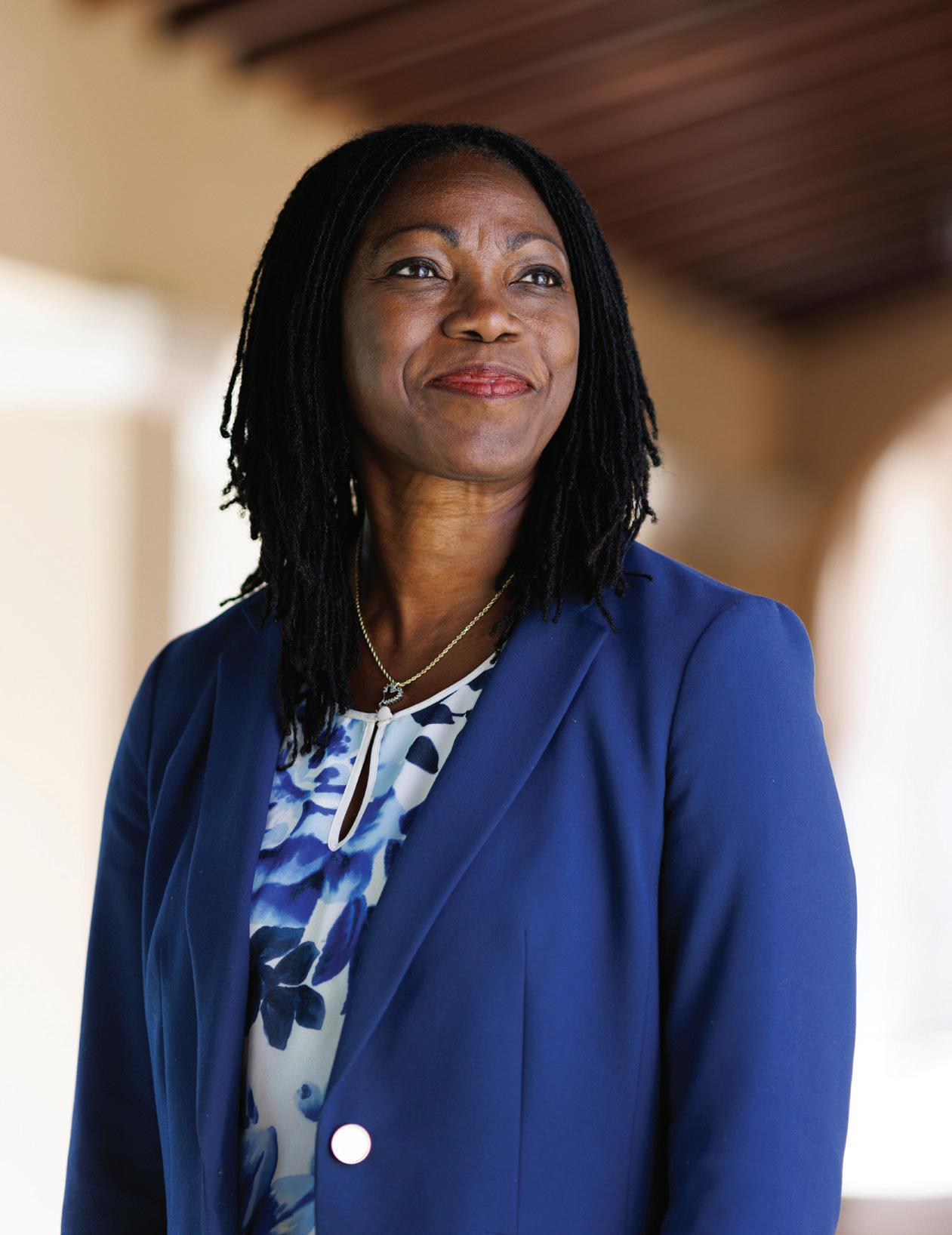
On February 20, the Rollins community showed the world what we can do when we come together to support our students.
By Audrey St. Clair ’03 Photos by Scott Cook ’24MBAAt Rollins, we have a long history of coming together as a community to achieve greatness, and Giving Day 2024 was no exception. A total of 1,306 Rollins alumni, parents, friends, faculty, staff, and students raised $459,052 for the Rollins Annual Fund, providing essential support for everything from financial aid and scholarships to applied learning and athletics.
Your gifts on February 20 helped unlock more than $190,000 in matching gifts from generous alumni and donors, bolstering our ability to provide the South’s best liberal arts education on a campus that inspires creativity, community, and collaboration. To celebrate, we’re sharing a few of our favorite stories about how your gifts are making an impact in the lives of our students.
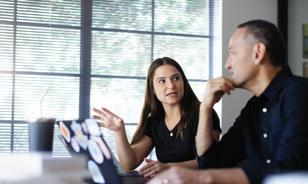
Thanks to you, students like international relations major Capri Gutiérrez ’23 receive the foundation to earn prestigious scholarships like the Fulbright.

Thanks to you, adult learners like Tiffany Jones ’16 are able to fulfill their dreams and advance their careers at world-renowned companies like Google.

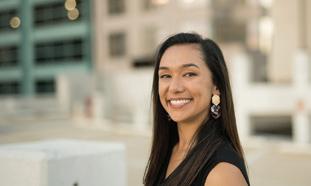
Thanks to you, budding leaders like Katalina Galeano ’21 ’25MBA have the opportunity to earn the No. 1 MBA in Florida at Rollins’ Crummer Graduate School of Business.
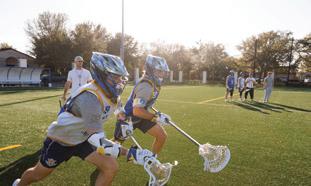
Thanks to you, Rollins continues to reinforce its reputation as one of the nation’s best colleges for blending academic and athletic excellence
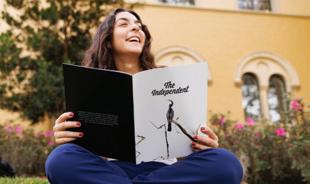
Thanks to you, up-and-coming communications professionals like Charlize Asmar ’26 are gaining essential hands-on experience through Student Media.

Thanks to you, the Rollins Museum of Art serves as a leading force in the community, earning accolades like best arts education in Orlando by Orlando Weekly.
MAKE
Missed Giving Day? You don’t have to wait another year to make a difference. Help make an immediate impact in the lives of Rollins students through a gift to the Rollins Annual Fund.
Rollins students gain the knowledge, experience, and expertise to pursue their purpose.
By Laura J. Cole ’04 ’08MLS | Photos by Scott Cook ’24MBAAt Rollins, we help the next generation of global citizens and responsible leaders realize their dreams and inspire them to find new ones. Through Rollins Gateway, our signature approach to liberal arts education, students secure the skills, know-how, and experiences they need to stand out from the status quo.
Gateway allows students to develop a broad range of knowledge across disciplines, deep expertise in their major, and a toolkit of skills like analytical thinking and complex problem-solving that prepare them to adapt and thrive no matter the challenges ahead. Students then apply their newfound abilities in the real world through everything from internships and research to study abroad and community service, giving them a competitive edge when applying for grad school or positions in the workplace. Along the way, they forge relationships with faculty, alumni, staff, and fellow students who serve as meaningful mentors at every step of their journey.
Discover how one recent graduate’s Rollins Gateway led to a passion for global development and a prestigious Fulbright research fellowship that’s allowing her to continue the important work she started at Rollins.

MEET CAPRI GUTIÉRREZ ’23
Major: International relations
Current status: In Uganda, working as a Fulbright Research Fellow with the Justice and Reconciliation Project to create a database of child victims of war that will be used by the Ugandan government and NGOs to provide essential support
“I had always wanted to make some kind of change in the world but didn’t know how. Every year at Rollins helped me narrow a path for myself.”

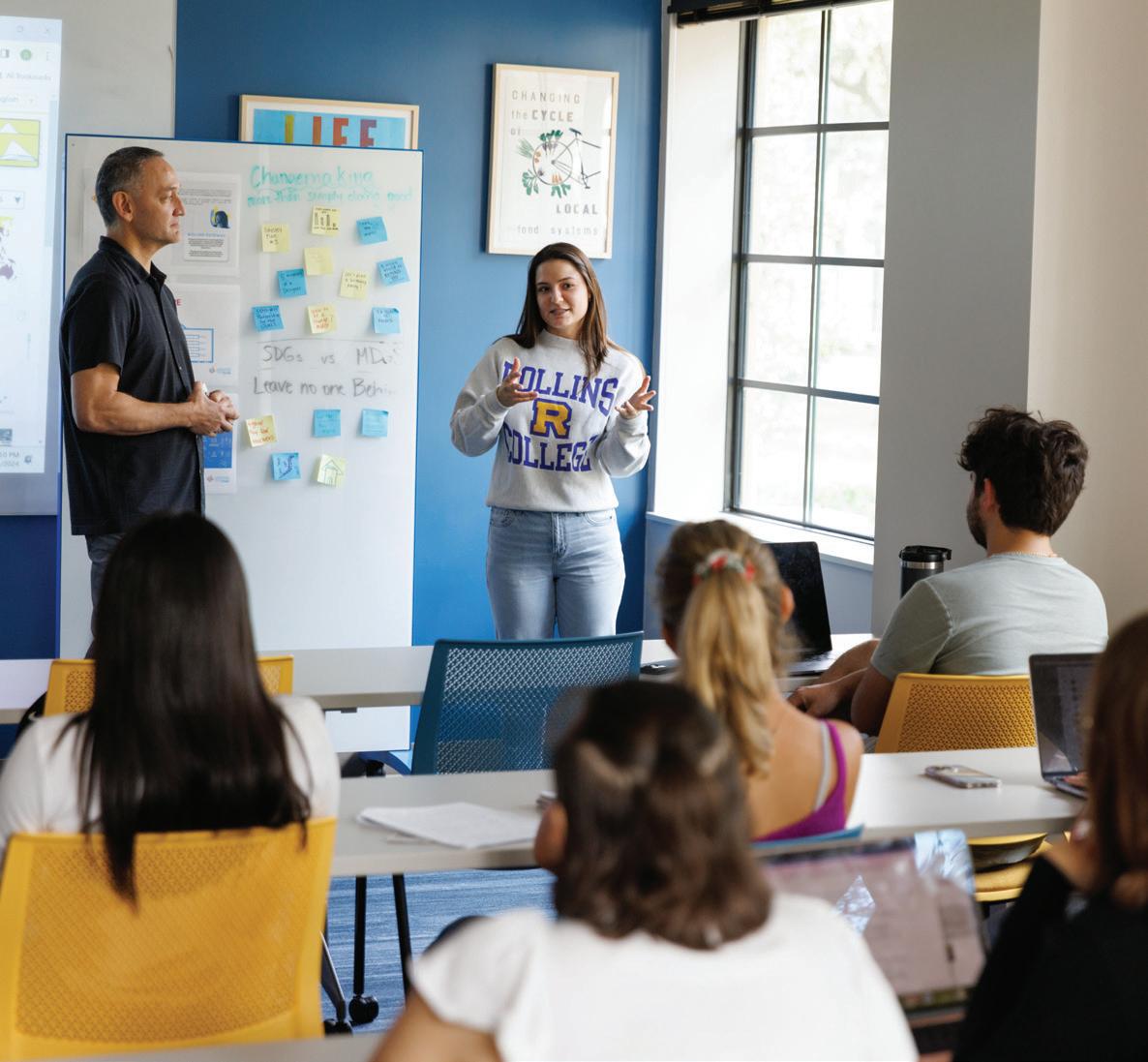
“At Rollins, I learned to think critically and through a global lens. [Political science professor] Dan Chong’s class, Politics of Global Poverty, confirmed my passion for global development, and now I’m publishing a book with him that will be taught to students in the same class that sparked my interests.”

Regardless of the path our students choose, they gain a solid foundation of knowledge and skills to succeed in our ever-changing world. Through our interdisciplinary core curriculum, they learn to think across barriers and work in diverse teams to tackle complex challenges. They learn to think critically, solve problems creatively, and make effective decisions—skills identified among those most important for future success by top executives in nine leading industries. Our students leave Rollins ready to thrive no matter what the future holds.
Students put the future-proof skills they learn in our small, discussion-based classes to work in the world through everything from internships to study abroad. They not only develop their passions and discover their purpose through these immersive experiences, but they also gain the kind of practical, real-world know-how that employers and graduate schools demand.
“I spent a semester abroad in Uganda, where I learned firsthand about community-based development by speaking with former child soldiers, refugees, and women impacted by gender-based violence. I also conducted research on the gap between policy and the needs of people living in remote Ugandan villages. This hands-on experience was essential to being selected for the Fulbright research fellowship, which is allowing me to continue the important work I started as a student at Rollins.”


Studies conducted everywhere from Gallup to the National Bureau of Economic Research point to mentorship as a key factor in both the personal and professional success of college graduates. At Rollins, our students are guided by a constellation of mentors—from faculty advisors and staff experts to peer guides and alumni mentors—who help them uncover their passion and give them the tools and opportunities to reach their goals.

“I received so much support from the Office of International Programs, the Office of External Fellowships & Scholarships, Rollins alumni, and my professors. My greatest mentor, Dr. Chong, helped me define my career goals, edited drafts for the fellowships and scholarships I applied to, and has been my biggest supporter. He saw me for the person I wanted to be, which pushed me to become that person.”

“I wouldn’t have been able to do any of this without Rollins. I wouldn’t have found my passion and be in Uganda now, or have been introduced to so many opportunities, or have received mentorship from Professor Chong, which has absolutely changed my life.”
The value of Rollins Gateway is in the combination of experiences, in the connections students make between them and how they combine to forge each student’s unique path. With the knowledge and skills to adapt to an ever-changing world, a wealth of real-world experience, and a strong network of relationships that extend well past Rollins, our students emerge from Rollins Gateway with purpose and passion ready to make a difference in the world both locally and globally.

See how Tars near and far are living out their meaningful lives and productive careers.
Past experiences inform future goals for Olivia Demarco ’02 ’15MBA, Rollins’ new executive director of alumni engagement.
By Laura J. Cole ’04 ’08MLS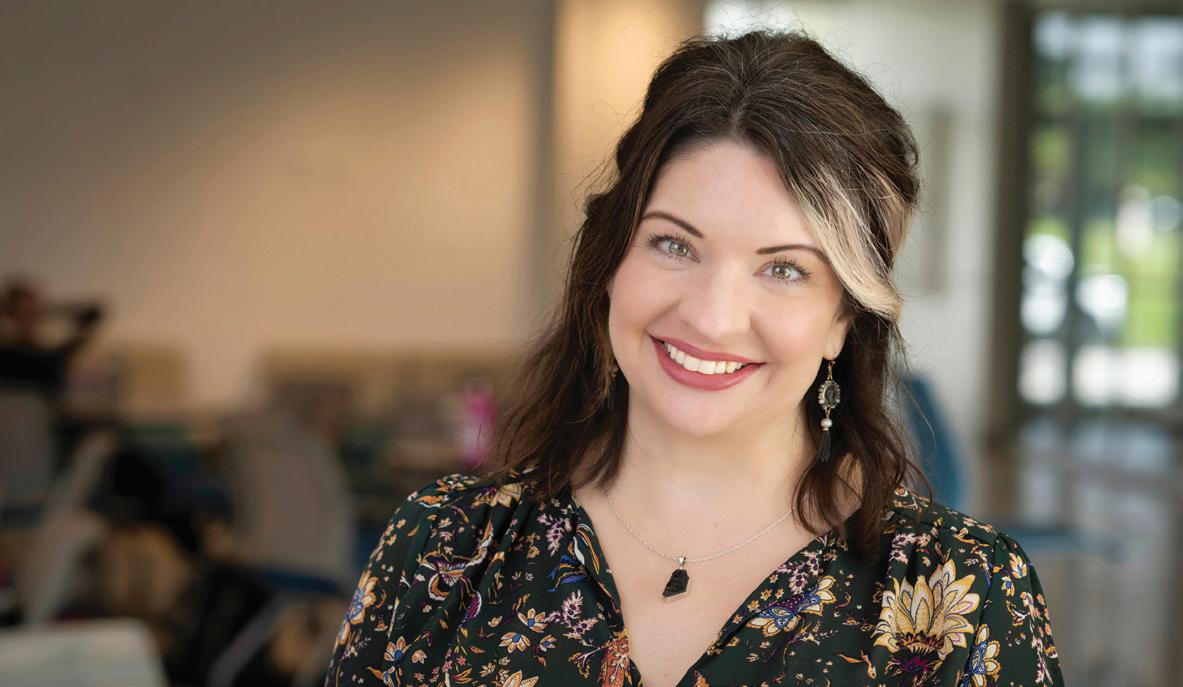
If you were to look for the narrative throughline in Olivia Demarco ’02 ’15MBA’s story, right in the center would be Rollins. As a teenager, her mom would share stories of teaching dance classes in the theatre department, and her dad would rave about the College’s reputation. She earned two degrees at Rollins—a bachelor’s in theatre arts and an MBA from Crummer—forged lifelong friendships, and managed the box office and marketing for the Annie Russell Theatre.
Demarco left Rollins to join the grand opening team and build guest-service operations at the Dr. Phillips Center for the Performing Arts and went on to hold senior leadership roles in marketing and operations at Orlando Repertory Theatre and Clean the World Foundation. No matter where Demarco went, though, she felt the pull of her alma mater. It’s no surprise then that she returned in 2022 as the associate director of advancement communications and is now moving into a central role for the College as executive director of alumni engagement.
“Olivia’s background as a dual alum, her professional experience, and her deep passion for what we do every day makes her the ideal candidate to guide the strategic planning of this important office and foster engagement among all Rollins alumni,” says Laurie Houck, vice president for institutional advancement.
For Demarco, it’s more than a natural progression for her past to merge with Rollins’ future. It’s a necessity. “Rollins has been part of my life since 1998, for more than half my life,” she says. “I see this role as my way of paying forward all that Rollins has done for me.”
We recently sat down with Demarco to learn more about what makes Rollins center stage in her life and how she plans to invigorate connections between alumni and the College.
What made you return to Rollins?
“I missed the culture, the campus, the community, and being part of a collaborative team. Here, there are people you can rely on.”
What appealed to you about this position?
“The energy and passion of the team and how powerful our alumni community is. Alumni are integral to the success of the College. Through philanthropy and volunteering, we propel Rollins forward. I want to be part of reconnecting more people to do just that.”
What’s your short- and long-term vision for the Office of Alumni Engagement?
“My short-term vision is to lift up the team that’s here and ignite the Alumni Advisory Board and the Crummer Alumni Board. Long term, I want to provide alumni with more professional development offerings and connections.”
Why should alums want to get involved?
“Rollins was such a formative experience for so many of us, but that experience isn’t guaranteed for new generations unless we help perpetuate it. A college—any college—is only going to be successful if it has people and philanthropy power behind it. If we want what we experienced—the traditions, the learning that made us better, and the connections that have gotten us where we are—for the next generation, we need to continue to shape the future of this special place in a positive way.”
Sharing your time, expertise, and connections with Rollins students can help fuel their career potential while strengthening your connection to your alma mater.
By Laura J. Cole ’04 ’08MLSPhotos by Scott Cook ’24MBA
Rewarding. That’s the recurring response from alumni when reflecting on their time spent with Rollins students, whether it’s as mentors, speakers, visitors, interviewers, or even hiring managers. Through these connections, students gain knowledge, skills, and experience that better prepares them for the road ahead. And for alumni, there’s the gratification of having provided students with the support and confidence they need to succeed.
“Watching and helping students flourish and grow to their fullest potential provides a lot of satisfaction and sense of accomplishment,” says Trustee Pat Loret de Mola ’78 ’80MBA.
Explore five meaningful ways you can give back to Rollins and the next generation of Tars.
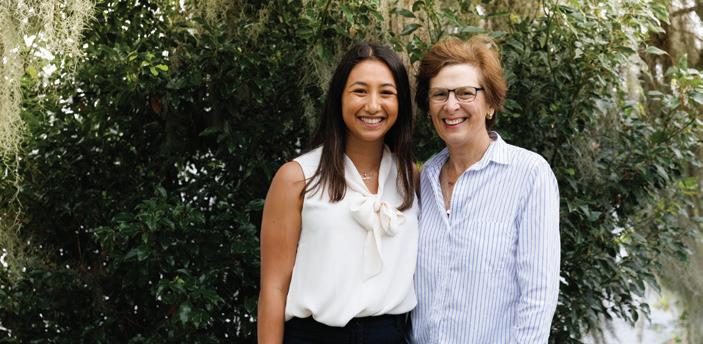
Students who have a mentor have been shown to perform better both in college and beyond. Through Rollins’ Career Champions alumni mentorship program, you’ll be partnered for an academic year with a student whose interests align with your expertise.
“It’s thrilling to be able to make a meaningful impact on a student’s life before they venture into the real world,” says de Mola. A serial entrepreneur with a storied career in banking and finance, she has mentored half a dozen Rollins students, including Angelina Khourisader ’23 ’24MBA.
“Because of Pat, I pursued a lot of opportunities, including studying abroad and doing a finance internship at Siemens,” says Khourisader, who now works as a management consulting analyst at World Wide Technology. “We both were student-athletes and attended Crummer, so we connected on so many levels. I’m grateful for our conversations, her help in navigating so many decisions, and her support through seven rounds of interviews and negotiating my salary.”
Alumni employers can play a pivotal role in launching Rollins grads into meaningful careers. In turn, by attending career fairs, you can discover students with the skills and knowledge to advance your organization.
“It’s imperative to find people who have the capacity to think critically beyond their specific major and who are a good fit culturally,” says Bill Shugart ’11, founder of art consulting firm Locol Arts. “Rollins has a good affinity for producing students who meet both of those criteria.”
Shugart recently hired art major Sam Trask ’23, whom he met while attending a campus career fair and whose knowledge and skills paired perfectly with a role he was looking to fill.
“If Bill hadn’t spent time talking to me about my interests and his business,” says Trask, “I wouldn’t have found this great opportunity as an art consultant, which aligns exactly with what I want to do professionally.”
As a speaker for events like the Crummer Innovative Leader Series, you can share your career path and insider’s perspective with students in related courses.
Trustee Campbell Brown ’90 has returned to campus several times to speak to students learning about family enterprises. As chair of the board of directors of Brown-Forman Corporation and former president of Old Forester, he shares stories and
advice on everything from corporate governance and responsibility to sustainability and philanthropy.
“Connecting how our time at Rollins informed our own professional journeys is always a story worth telling,” says Brown. “Our experiences help augment the business and corporate strategies shared through case studies and textbooks—and I’ve always been impressed with the preparedness of the audience.”
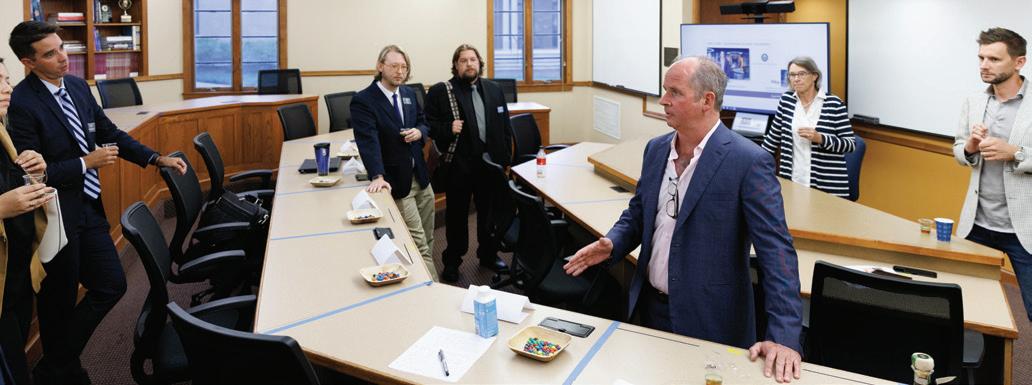
Engaging with students doesn’t have to involve a full-fledged presentation. There are a variety of opportunities on campus that provide a forum for students to ask their most pressing questions about your industry and career.
This past winter, Scott Smith ’91—co-owner of Speedway Motorsports and director of Sonic Automotive—participated in a TKE Talk on campus about the importance of leadership. Myles Long ’24 and Kobe Michail ’26 served as moderators.
“As co-founder of the Rollins chapter of TKE, I thought it would be a great opportunity to meet the guys and see the campus again,” he says. “I found the time to be exceptionally rewarding, and I connected with several undergrads—and initiated an internship program—as a result.”

During the culmination of their general curriculum requirements, students present an interdisciplinary capstone project each semester during the Foundations Summit. As an interviewer, you’ll prepare them to answer questions they’ll face during job searches.
Marisa Worley ’03, senior director of development at United Arts of Central Florida, recalls doing a mock interview when she was a student—and how much it benefited her. Now, Worley does the interviewing and talks to students about her career path and their studies. It’s one way she gives back to the college that prepared her for her career.
“Interviewing, having conversations about your work, and networking are all art forms,” she says. “The more students can practice in low-pressure environments, the more prepared they’ll be when they graduate.”
Learn more about how you can support the professional development of our students and recent grads.
Alumni Weekend 2024 was once again everyone’s favorite weekend of the year. We’re so glad you came back to campus to celebrate your time at Rollins and to look ahead to the brighter future you’re helping us build. Here are a few of our favorite moments from an unforgettable four days of fun and reminiscing.

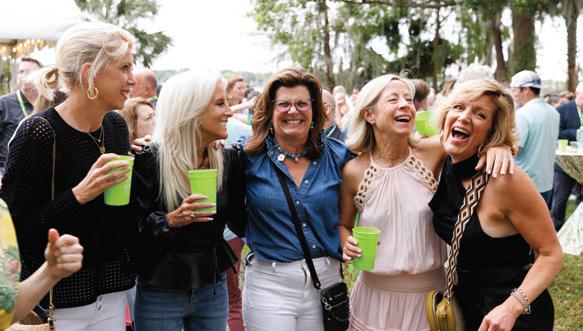


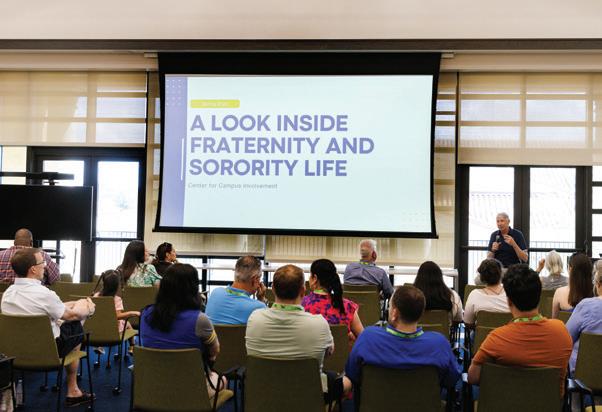

Alumni Weekend 2025 March 20-23, 2025
Class Reunions
1955 • 1960 • 1965 • 1970 • 1975 1980 • 1985 • 1990 • 1995 • 2000 2005 • 2010 • 2015 • 2020 • 2024
Learn More
From hotel reservations to event schedules, stay up to date on all things Alumni Weekend 2025.
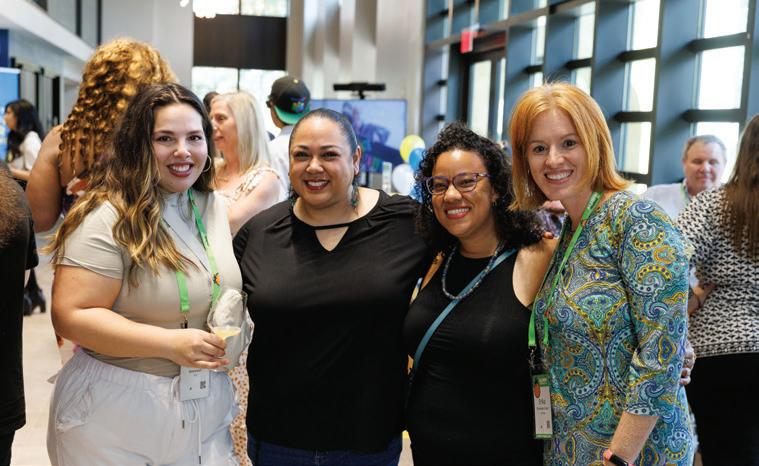


Dana Consler ’72 took a shot at making the Rollins golf team as a freshman. The surprising result changed his life, which is why he’s now gifting a transformational endowment to the program.By Robert Stephens | Photo by Noah Becker
Dana Consler ’72 arrived in Winter Park from upstate New York in August 1968 with a bag full of golf clubs and a pocket full of quarters. The teenager who had never heard of Rollins College until a few months earlier was about to make a bold investment in his future.
“You could say I was an outlier in my high school class,” says Consler. “I wanted a different college experience, not just books and partying. I wanted some culture and to see the world. And I wanted to be in the South so I could play golf occasionally.”
More than 50 years later, Consler’s memories of his first few days on campus are as strong as his voice providing the details.
“My parents drove me down, dropped me off, and said ‘good luck.’ I couldn’t wait for the next four years to start.”
By Friday of orientation week, Consler decided it was time to see the world. So he snuck out early to explore a golf course while everyone was still learning about college life.
“As I was leaving campus, I saw 12 other freshmen looking for a ride to the same golf course,”
he says. “I knew I was in the right place with the right people.”
He remembers birdying the first hole that day and shooting a one-under-par 71. Later, he used his quarters to call home from a payphone on Mills Lawn. His mom and dad heard confidence in their son’s voice: “The people are easy to meet. The classes are small. The professors are accessible. I really like it here.”
Consler’s connection with Rollins galvanized with each passing day. A year after graduating in spring 1972, he showed his gratitude by sending
a $25 check to Rollins. It has become an annual routine, with the dollar figure increasing every year.
“I look forward to writing those checks,” says Consler.
Two years ago, to celebrate his 50th reunion, he wrote a check for $50,000. Then, in 2023, he went all in with a sevenfigure bequest to Rollins under his will, a $500,000 financial aid endowment, and another endowment of $1 million for the men’s golf program, which will provide roughly $45,000 a year in perpetuity. The latter endowment is the first gift of its kind to a nonrowing sport at Rollins.
“The golf program gave me some of my best memories,” says Consler. And they were memories he didn’t expect.
Back to that first phone call he made to his parents. Toward the end of the conversation, he dropped a surprise: “I think I’ll try out for the golf team as a walkon.” Consler had no expectations of making the team. He knew a student from upstate New York faced long odds against yearround players from Florida.
“Making the golf team would be a big deal because it would add something to the college experience that I didn’t anticipate.”
Consler competed for one of the handful of walk-on spots by playing four rounds over two weeks. “And I made it,” he says, still sounding surprised more than 50 years later.
Friends back in Rochester stopped asking Consler where Rollins was located and why he had such a great tan during the holidays. They could tell he
found the college experience he wanted, and it happened to include competitive golf.
“Being on the team impacted my future in finance because it required attention to detail and organization,” he says. “I had to finish classes by noon, be at practice by 1 p.m., get back to the dining hall before it closed, and find time to study.”
Rollins didn’t have a business major at the time, so Consler majored in economics.
“It turned out I didn’t need the exact major because my classes gave me exposure to a wide range of subjects, and I applied all of them to my career.”
He learned one of his most valuable business lessons on the golf course.
“There’s nothing more important in business than relationships, and you can often learn more about a person on the golf course than you can in the office.”
When Consler ramped down his 30-year finance career, which culminated in his role as executive vice president at Karpus Investment Management, he began to focus on estate planning. The good life, for him, has always been about giving back—and making time for the sport he loves.
“I’m fortunate to have made some good decisions, including the decision to go to a college no one in the Rochester area had ever heard of. I went to Rollins hoping to find a different experience, and I found more than that. I found a great springboard for the rest of my life.”
1. BEQUEST
This monetary gift passes through a will or trust. It can be designated for scholarship aid, the music department, athletics, or however you choose.
2. BENEFICIARY
You can add Rollins as a beneficiary to receive a percentage or specific dollar value from your life insurance or retirement funds.
3. LIFE INSURANCE
You set up a separate life insurance policy, with Rollins as the owner, and make premium payments each year.
4. RETIREMENT ACCOUNTS
When you leave an IRA or 401(k) as a “charitable gift,” the money isn’t taxed. You can replace this asset with life insurance as a family inheritance.
5. CHARITABLE GIFT ANNUITY
In exchange for a gift of $10,000 or more, Rollins makes annual payments back to you for the rest of your life.
To see your gift used during your lifetime, you can also create a “named endowed fund” with a gift of $100,000 or more. It will be invested in the College’s investment fund. Each year in perpetuity, 4.5 percent of the earnings would be expended toward the designation of your choice.
To learn more, contact Beth Fontes, executive director of major and planned giving, at 407-646-2508 or efontes@rollins.edu.
Photographer Richard Savid ’76 has released over 40 years of work in his book Portraits from My Darkroom. Savid’s 100 black-and-white portraits include powerful images from his home state of Florida and across the globe, including Italy, the Dominican Republic, Ireland, Spain, Japan, and the Philippines, where he served in the Peace Corps.


Zachary Dunbar ’84 recently published “Writing and Performance Training” in the Oxford Handbook of the Global Stage Musical. Dunbar is currently an associate professor and principal fellow of the University of Melbourne in Australia. Laura (Thompson) McFaden ’87 is an art coach with Artriculate, a college counseling and private art instruction resource for teens planning to study creative arts in college. Her 2023 students had a landmark year, receiving over $4 million in scholarships and gaining admission to top art school programs across the country, including Rollins.
Lawrence Rachlin ’45 is 100 years old and still working as an aviation insurance broker in New Jersey. His diploma was signed by Hamilton Holt.
Three generations of Tars—Wally Ramsey ’59, Jim Ramsey ’84, Gus Ramsey ’89, and Jack Ramsey ’23—gathered together in October.
During Alumni Weekend, Anne Barnes Colin ’77 and Shelley Wilson ’77 attended a gathering celebrating their Phi Mu sorority affiliation at the home of Alison Flesh Morrow ’77
After living in Winter Park for 50 years, Barbara (McMinn) McKnight ’77 recently moved to Atlanta to be closer to two of her three children and is enjoying connecting with Rollins through local alumni events.
Last March, Johnny Glenn Harding ’87 celebrated 30 years with Mark James Lopez at a destination wedding in Palm Springs, California, where the couple made their union legal. In attendance were Frank Greene ’87, Jennifer Sutton Greene ’87, Barbara Ward Meyer ’87, Amy Teets Triggs ’87, Beth Zanarini ’87, Georgia Sattele Bickel ’88, Candy Kellogg Darby ’88, Megan Thomas Hollister ’88, Elle Payne Williams ’89, and Desiree Martin ’96
This past December, Craig Campbell ’96 traveled to New York City to celebrate his birthday and was surprised by many fellow alums, including Jeff Dattilo ’96, John “Nick” Sanzo ’96, and Aaron Bean ’96. Together, they attended Spamalot on Broadway to support longtime friend Christopher Fitzgerald ’95 in his leading role as Patsy.
Ryan Antisdel ’08 celebrated his one-year anniversary of being a commercial pilot at United Airlines. After graduating from Rollins, Antisdel earned an MBA in aviation management from Embry-Riddle Aeronautical University.
Last May, Gary Martoccio ’08 and Kailyn Bresnahan were married in Casa De Campo, Dominican Republic. Martoccio practices employment law in Tampa and holds a law license in eight states.






This past February, Wendy White Prausa ’82 was inducted into the Georgia Sports Hall of Fame. A dominating junior tennis player in the state of Georgia, Prausa earned several No. 1 rankings and won or was a finalist in over 30 junior and amateur tournaments between 1977 and 1978. She ranked as a national champion while playing tennis at Rollins, earning the Broderick Award as the nation’s best collegiate female athlete and going on to play professionally on the WTA tour from 1978 to 1990.

Rollins Trustee David Lord ’69 ’71MBA ’16H was nominated for Housing Colorado’s prestigious statewide Eagle Award, which recognizes individuals for their work around affordable housing.
Rodney Adkins ’81, vice chair of Rollins’ Board of Trustees, has been inducted into Georgia Tech’s engineering alumni hall of fame, which honors those who have achieved major engineering milestones in their careers.
Ann Marie Varga ’82 ’12MHR P’11 P’12 was inducted into the Public Relations Society of America’s College of Fellows, one of the highest recognitions in the field of public relations.
Joni (Holzschuh) Hannah ’84 was recently inducted into the USTA Mid-Atlantic Hall of Fame, joining tennis legends like Pam Shriver and Arthur Ashe, among many others.
The Algernon Sydney Sullivan Foundation presented its 2024 Luminary Award to Mark F. Peres ’85 P’20 during the Sullivan Showcase.
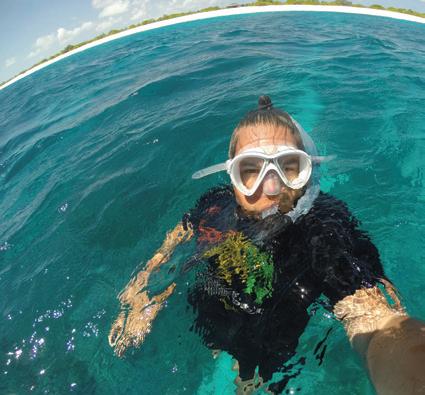
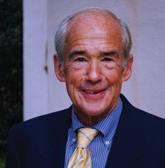

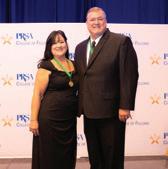

Kirk Nalley ’93 ’01MBA has been promoted to regional vice president of sales at 3CLogic, covering New England, Chicago/Midwest, and Canada. Nalley has been in technology sales for over 16 years.
Susan Frantz ’09, founder and CEO of Frantz Marketing Solutions, was selected as a 40 Under 40 honoree by Southwest Florida’s Gulfshore Business Daily and was elected as president of the Southwest Florida Chapter of the Florida Public Relations Association (FPRA) for the 2023-24 term.
Realtor Cassandra Daniel ’13 ’15MBA was nominated by the Florida Small Business Development Center as one of 15 distinguished and remarkable Small Business Excellence Awards Entrepreneurs of the Year.
Mackenzie Abrahamyan Cooper ’16, promotion coordinator at Triple Tigers Records, was honored as the “New Face of Country,” a peer-nominated award presented to a rising leader in the country music industry.
Angelo Villagomez ’04, senior fellow at the Center for American Progress, was named one of 2024’s 500 most influential people in policy by Washingtonian for his ongoing work in ocean conservation. He has presented recommendations to the White House and the Department of Interior on how to involve indigenous people in the designation of new national marine sanctuaries to help the administration reach its goal of protecting 30 percent of U.S. oceans by 2030.
Rollins was teaching interdisciplinary approaches to the environment before it became a buzzword in the wider conservation community. The education I got at Rollins went beyond theory; it taught me how to apply it.
— Angelo Villagomez ’04Kate Miller ’97 recently received her doctoral degree in education from Marymount University. She specializes in coaching introverted leaders and individuals through her business, KM Coaching.
Kelly Clement ’99 has launched Watermelon Math, an ISEE and SSAT prep kit for ages 9-12, now available on shelves at the Writer’s Block Bookstore on Park Avenue in Winter Park.
Eleanor “Nellie” Lackman ’00 graduated from UCLA’s Anderson School of Management MBA program with a specialization in entertainment, media, and sports. She is currently a partner at Mitchell Silberberg & Knupp LLP, specializing in copyright and trademark matters.
Neil Otto ’05 has recently joined the LEGO Group, a part of the company’s LEGO Education U.S. division. In this role, he consults with districts, teachers, and sales teams on federal, state, and local funding options for STEM education.
Jessica (Camplese) Sullivan ’06 has started a new position as an educational puppeteer with the Champions for Children program, The Kids on the Block. The educational puppet troupe travels to schools throughout Tampa Bay teaching children how to safely recognize, report, and get help when they or someone they know is suffering from unsafe situations.
After practicing dentistry for 10 years in Central Florida, Kenneth Jainandan ’07 has successfully opened his first boutique dental practice in the heart of Tampa Bay’s Seminole Heights neighborhood.
Virginia McColl ’17 was promoted to AVP, senior business development manager at Sotheby’s in New York City, where she specializes in contemporary art.
Elizabeth (Krebs) Garrison ’18 started a new position as director of stewardship and scholarship at Florida Southern College in Lakeland, where she oversees the comprehensive stewardship program of donor communications, scholarship reporting, proposals, and special events.
Devorah Burgess ’21 has recently joined the Walt Disney Archives in California as an assistant archivist. She helps collect, preserve, and make available for research the historical materials relating to Walt Disney and the company he founded.
Saffron Pollard ’23 has received a promotion to HR employee engagement officer at Mercuria Energy Trading S.A. In this role, she supports the HR team in delivering strategic and operational HR services—from hiring and benefits administration to development initiatives and performance management.

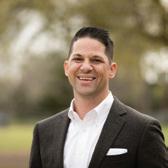

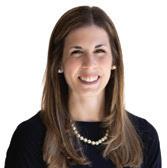

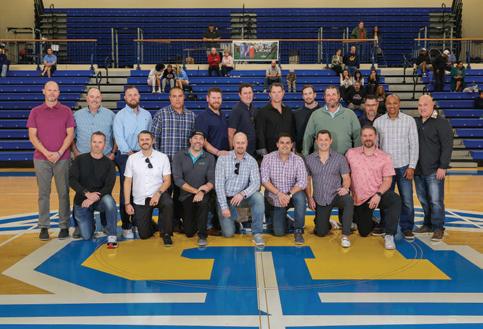
Former Rollins baseball coach Bob “Rike” Rikeman worked with Pennie Parker, associate vice president of athletics, and current baseball coach Jon Sjogren to host a reunion 20 years in the making. The 2004 men’s baseball team achieved the honor of being the only team to win the Sunshine State Conference (SCC) in Rollins history, making it all the way to the Division II World Series. In celebration of their 20-year reunion, the team was presented with two new banners now displayed at Harper-Shepherd Field highlighting both their SCC championship title and World Series showing.
Philadelphia Magazine named Ellie Rushing ’19 one of 150 Most Influential Philadelphians of 2023 for her work covering the city’s devastating gun violence crisis. A reporter for The Philadelphia Inquirer since 2019, Rushing first served on the breaking news desk before turning her focus to criminal justice, particularly how shootings affect children and teens.
Learning from world-class editors and reporters at the Sun Sentinel during college cemented my passion for local journalism and allowed me to build a strong portfolio, which helped me land an internship with The Philadelphia Inquirer after graduation.
— Ellie Rushing’19
Zell Rogers-Sessions Kellogg ’46
January 3, 2024
Joan Curtis McKeithen ’55
September 30, 2023
Stewart Turley ’56
February 23, 2024
Ronald W. Culbreth ’65
January 9, 2024
Thomas M. Barry Jr. ’66 February 1, 2024
Stephen M. Combs ’66 November 29, 2023
David L. Jacobs ’66 October 31, 2023
Richard D. Gates ’68MCS
December 21, 2023
Cyrus W. Grandy V ’69
February 29, 2024
John L. Kennedy ’70 ’72MBA
August 24, 2023
James A. Moore ’72
February 7, 2024
Nancy Aspinwall ’73
April 17, 2023
Krisita A. Jackson ’73
December 1, 2023
James P. Trocchi ’73
June 3, 2023
Charles J. Moniack ’74MSM
August 19, 2023
Roeann E. Linzee ’76
September 1, 2023
Tracy Kolker Ochsman ’76
October 4, 2023
William H. Arnold ’77
January 30, 2024
Pamela H. Gustaff ’80
August 27, 2023
John F. Panik Sr. ’84
October 12, 2023
Melissa M. Beem ’85
March 12, 2024
Preston G. Curtis ’85
June 16, 2023
Sara Kettler Friend ’85 April 3, 2023
Peter D. Wilk ’87
April 2, 2024
Julian J. Vincze ’95
January 1, 2023
Nani M. Sanowski ’04MA November 10, 2023
Justin R. Kagan ’14
February 7, 2024
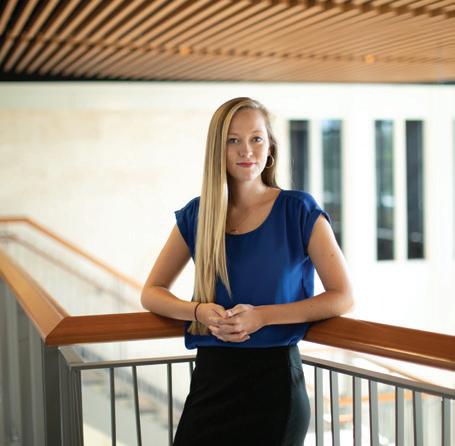
STAY IN THE KNOW
You don’t have to wait for the magazine to stay up to date with your classmates. Keep an eye out for our monthly Class News feature in the FoxFlash newsletter.
Scan here or visit rollins.college/gogreen to receive your magazine electronically. If you choose this option, you will no longer receive the print version of Rollins magazine.
HAVE NEWS TO SHARE? Visit rollins.college/classnews to fill out a class news submission form, or mail your news to: Rollins College Class News Office of Alumni Engagement 1000 Holt Ave. – 2736 Winter Park, FL 32789-4409
NEED TO UPDATE YOUR CONTACT INFORMATION? Visit rollins.college/ alumniupdate or notify us at alumni@rollins.edu or 800-799-ALUM
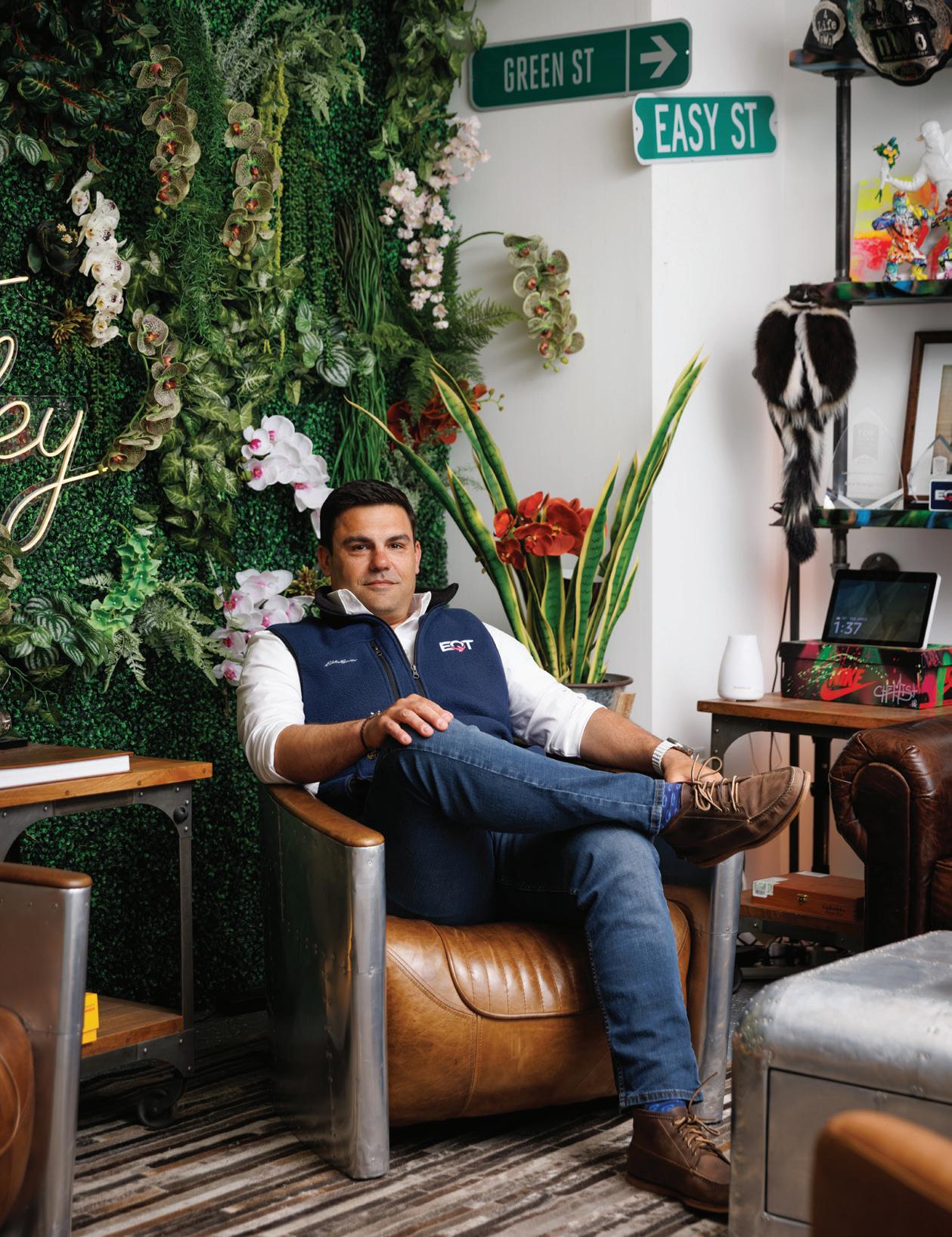 By Luke Woodling ’17MBA | Photo by Scott Cook ’24MBA
By Luke Woodling ’17MBA | Photo by Scott Cook ’24MBA
Twenty years ago, Toby Rice ’04 captained the Rollins baseball team to its first Sunshine State Conference (SSC) title and the semifinals of the DII College World Series. Along the way, Rice and his teammates reeled off a 20-game win streak en route to a 48-12 record, at that point the best mark in program history.
The team was short on star power, but what they lacked in raw talent they made up for in grit, dedication, and a never-say-die determination. Coach Bob Rikeman affectionately called them the Dirtbags, a moniker the team embraced along with their underdog status.
Rice, who was named SSC Player of the Year that season, was one of the Tars’ best players, but his qualities as a leader were just as critical to the team’s improbable run as his .376 batting average.
Just three years after that magical season, Rice founded Rice Energy with his brothers Daniel and Derek right at the start of America’s fracking boom. The fledgling outfit carved out a presence in Pennsylvania’s Marcellus Shale—home to the country’s biggest natural gas field—by outhustling, outwitting, and outmaneuvering larger, more established operators. When they sold the company to EQT in 2017 for $8.5 billion, the brothers had built Rice Energy into a top 10 producer from the ground up.
Today, as president and CEO of EQT, Rice helms a Fortune 500 company and the nation’s largest producer of natural gas. But while the field on which Rice plays has grown significantly, his values, his leadership style, and the keys to his success are still rooted in his time guiding one of Rollins’ historically great teams.
Being underestimated can be great motivation. My brothers and I were definitely outsiders when we started Rice Energy, but we never shied away from it. Instead, we embraced that underdog status and used it to motivate ourselves and our team.
You have to take care of the details. We’ve always been very methodical about the things we do and how we do them. That’s really important whether you’re building a business from the ground up or leading a Fortune 500 company.
Do what you say you’re going to do. Trust is our No. 1 value, and building strong relationships has always been one of the keys to our success.
Communication is the key to getting better as you get bigger. You can have the best playbook in the world, but if you can’t communicate it, then it’s worthless.
Building a winning culture is all about alignment. At Rollins, Coach was great at showing us the things he really cared about and making sure that we were all aligned around those values. We do that same exercise at EQT. Everyone on the team—from my direct reports to the people who are turning wrenches in the field—are in alignment about what we value as an organization.
You can’t tell if you’re winning if you’re not keeping score. We track more than 3,000 performance metrics across the 400 different roles that we have within the organization, so I can tell you at any given time what our company score is and whether we’re winning or not.
Technology is the key to differentiated results. I learned that early on when new frack technology gave us the edge we needed to break into the business and grow Rice Energy into a top 10 producer. Today, our biggest edge is our communications technology that connects experts from across the entire world to work here.
Building a great organization is like surfing. It takes a lot of effort to power through the breakers and paddle onto a wave, but once you’re riding that wave and you’ve built a great culture, a lot of things really start taking care of themselves.
ROLLINS COLLEGE
1000 HOLT AVE. – 2754
WINTER PARK, FL 32789-4499
CHANGE SERVICE REQUESTED

Serve as a mentor to a Rollins student and you’ll not only lend guidance, offer insights, and provide glimpses into future meaningful lives and productive careers. According to research from Gallup, you’ll also more than double the likelihood that your mentee will thrive in their life and career. Rollins’ Career Champions program is actively seeking alumni mentors to meet the enthusiastic demand from students. Scan or visit rollins.college/careerchampions to learn more about the College’s flagship alumni mentorship program.